Here's an article from the Onion - the satirical newspaper - that prompted me to write this in the first place:
Many people have asked me recently about what the mood is like in Japan now that North Korea is, apparently, a nuclear power. After all, it's the Japanese who have the most to fear from N. Korea; with the North Korean missile tests, the Japan has already had two shots fired across its bow. I read in the NY Times online or the BBC News that there's a great fear of nuclear proliferation, of what a maniac like Kim Jong Il might do. The Koreans - even the South - still carry a great deal of resentment, to say the least, against the Japanese over what happened during WWII, and the consistent refusal of the Japanese government to accept responsibility for its wartime actions.
Considering the amount of basic hysteria across much of the US about terrorist attacks - even in places (the entire Midwest?) no terrorist could possibly have heard of, let alone care to target - I thought there would be some level of popular discourse about this situation. I came to work the day after the announcement of the testing of a nuclear weapon. I waited to hear teachers commiserate over their anxiety, or students to ask questions about what would happen, or the principal to make some sort of statement. I waited entirely in vain. The only announcement at the morning meeting was to report on a bicycle accident and remind students to be careful on their way to school. Talk between teachers was as rare as always and as always centered around classes and the monotony of grading papers. Everyone acted like they hadn't heard anything at all, to the extent that I wondered if in fact they hadn't heard anything at all.
Finally, sitting at the computers and reading the newspaper, I brought it up with the Beach Boys Sensei and another teacher. I asked them if they were aware of what was going on, and how they felt. They said of course they knew about it, but responded, "what are we going to do about it?"
And that sort of shrugging off really typified for me the attitude of most everyone here regarding politics. If people are aware of politics at all, they seem aware of it in a totally peripheral way. Politics seems to be to most Japanese, something that happens off in Tokyo. Politics is the business of politicians, and these decisions are to be made by the people off in those governmental buildings. They'll take care of it, so it isn't necessary for people to have opinions either way on issues; they just need to do their jobs.
And know I'm coming from a country where the majority of people don't even vote, and even if they do, it's often based on party lines or without a clear understanding of the issues. Still, I have a hard time imagining Bush getting angry at representatives from his party that don't fully support him and fielding new candidates in an election for their districts that don't even live in the areas. But that's what Koizumi did in the last election; he blacklisted several representatives and sent actresses and businesspeople to run in areas of Japan they might not even have visited before. And they won. People voted for candidates that don't even live in their areas or know anything about them to represent their hometowns and their interests in parliament. That seemed to me to be a pretty clear indictment of how seriously people take the idea of representative government here.
The LDP, roughly equivalent to the Republican party in the US, has been the ruling party here for almost 50 years, with only one brief interruption. We complain about our two party system being inadequate for a real democracy; the system here is a joke. The same giant conglomerates that ran Japan before and during WWII - the equivalents of the huge German companies basically - were never dismantled or run through any sort of process comparable to the de-Nazification in Germany. The current top politicians are either holdovers or descendants of the same people who drove the country right into war before and never recanted afterward. The Emperor has never been held responsible for anything he did, so how can anyone else be, really?
These things shock me, but leave no impression on most people it seems. There was no political discussion going on at Waseda when I was studying there; no protests, no activism, no general awareness of issues at all, really. The complete disassociation with what's going on in their country by people here leaves them dangerously open to being led into another bout with disastrous nationalism. With the same sort of people in power as before WWII, it's just fortunate that the current goals of the government seem merely economic.
Tuesday, December 19, 2006
Saturday, December 02, 2006
Christmas with the heathens
Next week is final exams so I've been taking it easy on the kids and teaching classes about Christmas. I play Christmas songs (Nat King Cole - The Christmas Song mostly, since that's the only xmas song I can stand to listen to the requisite 40 times or so I will in the course of teaching all the first year students) and the kids try to fill in missing words on lyric sheets; I pass out candy canes and have them write letters to Santa. One day, a teacher asked me to talk a little more about the origin of Christmas - assuming, I guess, like all Japanese do about all Americans, that I am a Christian of deep faith. I had toyed with the idea in the beginning, but thought it might come off as proselytizing, but on further reflecting, realized clearly there no harm in merely talking about religion.
So after listening to Nat King Cole for the umpteenth time, I write the word "Christmas" on the board and ask the kids what they know about the holiday. They volunteer and I list words like toys, Santa, reindeer, Christmas tree, etc. "Okay," I say, "so maybe when you think of Christmas, these things come to mind."
"But, does anyone know why Christmas is a holiday?"
Blank stares.
I think that maybe they just didn't understand the question, so I rephrase it: "Does anyone know what happened on Christmas?"
Blanker stares.
I pause and, stifling a laugh, take a deep breath. Then I turn to where I've written "Christmas" on the board and underline "Christ" several times. I turn back to the class and ask, cautiously this time, "Do you know who this is?" I wince a little for a few seconds as if anticipating a blow, but fortunately one of the kids says the Japanese name for Christ (kirisuto), and I don't have to freak out completely.
"Okay great, Christ, yes. Jesus Christ. (in a fashion taking His name in vain) Jesus Christ, yes. Now, what happened to Jesus Christ on this day?"
A student raises a hand tentatively and says in Japanese, "That's when he died, right?"
I run my fingers through my hair quite hard. "No." I smile. "In fact, the opposite thing happened. And speak in English."
Another says, "Ah, it's his birthday."
"Yeah, more or less. So, let me tell you the story of his birth."
It turns out that they don't really study world religions, at least not until their junior or senior year of high school. I have a hard time comprehending that these sophomore kids at a high-level high school don't know basic facts about the largest religion in the world, since I learned about Shinto in my 7th grade history class. This is kind of insane. So I decide to right this wrong. I am here to bring them the good news, as it were.
I whip out some Christmas picture books and proceed to tell the story of the Nativity. In the course of trying to explain to the kids why it was such a big deal that a baby was born in a manger in some far-off place thousands of years ago, I come to appreciate to an extent how ridiculous missionaries must feel on their first day off in some African village. Trying to explain a religion to someone completely unfamiliar with the stories just reveals how ridiculous they can sound. I see a new expression of bafflement cross the faces of the students for each phrase like "son of God" or "angels" or "three kings" that comes out of my mouth. By the end of the story, I am rather baffled at what's coming out of my mouth as well. You'd have to be a person of unshakeable faith to speak in any way convincingly about these things without feeling a bit silly or embarrassed. I am not that person.
This reaches a sort of crescendo while I'm using the tiny statuettes of the Nativity scene to act out the different character's parts. After a long explanation of the relationship between Mary and Joseph where I've been holding up their two figures, I actually look down at what I'm holding and see that in fact what I'm holding is not Joseph but some random shepherd. Upon closer inspection, I realize that on top of the general discernible differences between the two figures, the shepherd actually has a damn sheep hung around his neck. So, not only have I been telling a rather sacrilegious story about the unconsummated love of Mary and one shepherd from Bethelehem, but I've convinced all the kids that Jesus' father walked around with a sheep strung around his neck at all times. I break and just laugh really hard.
I give up in the end and just have them write their letters to Santa. I tell them about Santa's list; presents for the good children and coal for the bad. This is much easier to talk to the kids about. It doesn't make me embarrassed as an American or feel ridiculous at all. As silly as Santa's story is, at least we all agree none of it is true.
So after listening to Nat King Cole for the umpteenth time, I write the word "Christmas" on the board and ask the kids what they know about the holiday. They volunteer and I list words like toys, Santa, reindeer, Christmas tree, etc. "Okay," I say, "so maybe when you think of Christmas, these things come to mind."
"But, does anyone know why Christmas is a holiday?"
Blank stares.
I think that maybe they just didn't understand the question, so I rephrase it: "Does anyone know what happened on Christmas?"
Blanker stares.
I pause and, stifling a laugh, take a deep breath. Then I turn to where I've written "Christmas" on the board and underline "Christ" several times. I turn back to the class and ask, cautiously this time, "Do you know who this is?" I wince a little for a few seconds as if anticipating a blow, but fortunately one of the kids says the Japanese name for Christ (kirisuto), and I don't have to freak out completely.
"Okay great, Christ, yes. Jesus Christ. (in a fashion taking His name in vain) Jesus Christ, yes. Now, what happened to Jesus Christ on this day?"
A student raises a hand tentatively and says in Japanese, "That's when he died, right?"
I run my fingers through my hair quite hard. "No." I smile. "In fact, the opposite thing happened. And speak in English."
Another says, "Ah, it's his birthday."
"Yeah, more or less. So, let me tell you the story of his birth."
It turns out that they don't really study world religions, at least not until their junior or senior year of high school. I have a hard time comprehending that these sophomore kids at a high-level high school don't know basic facts about the largest religion in the world, since I learned about Shinto in my 7th grade history class. This is kind of insane. So I decide to right this wrong. I am here to bring them the good news, as it were.
I whip out some Christmas picture books and proceed to tell the story of the Nativity. In the course of trying to explain to the kids why it was such a big deal that a baby was born in a manger in some far-off place thousands of years ago, I come to appreciate to an extent how ridiculous missionaries must feel on their first day off in some African village. Trying to explain a religion to someone completely unfamiliar with the stories just reveals how ridiculous they can sound. I see a new expression of bafflement cross the faces of the students for each phrase like "son of God" or "angels" or "three kings" that comes out of my mouth. By the end of the story, I am rather baffled at what's coming out of my mouth as well. You'd have to be a person of unshakeable faith to speak in any way convincingly about these things without feeling a bit silly or embarrassed. I am not that person.
This reaches a sort of crescendo while I'm using the tiny statuettes of the Nativity scene to act out the different character's parts. After a long explanation of the relationship between Mary and Joseph where I've been holding up their two figures, I actually look down at what I'm holding and see that in fact what I'm holding is not Joseph but some random shepherd. Upon closer inspection, I realize that on top of the general discernible differences between the two figures, the shepherd actually has a damn sheep hung around his neck. So, not only have I been telling a rather sacrilegious story about the unconsummated love of Mary and one shepherd from Bethelehem, but I've convinced all the kids that Jesus' father walked around with a sheep strung around his neck at all times. I break and just laugh really hard.
I give up in the end and just have them write their letters to Santa. I tell them about Santa's list; presents for the good children and coal for the bad. This is much easier to talk to the kids about. It doesn't make me embarrassed as an American or feel ridiculous at all. As silly as Santa's story is, at least we all agree none of it is true.
Tuesday, November 28, 2006
Student life at Hamanan
Recently I set up a blog for the students in the English club at my school. I wish I could say it's off to a rousing start, but that would a little too generous...anyways, it is certainly off to a start of some kind. Perhaps a bemusing one?
Hamanan English Club blog
The students were asked to write short self-introductions, which prompted stories about car accidents, "soft-ball tennis," BAGELs, and PSP; not ordinary topics during first conversations.
Anyways, I'm going to try to get them to write a little something every week. I'm hoping it will, aside from allowing them a measure of self-expression not allowed, let alone encouraged, in their other classes, let others see the general lives of students here. Whether that will be interesting or depressing remains to be seen. Feel free to check it from time to time.
Hamanan English Club blog
The students were asked to write short self-introductions, which prompted stories about car accidents, "soft-ball tennis," BAGELs, and PSP; not ordinary topics during first conversations.
Anyways, I'm going to try to get them to write a little something every week. I'm hoping it will, aside from allowing them a measure of self-expression not allowed, let alone encouraged, in their other classes, let others see the general lives of students here. Whether that will be interesting or depressing remains to be seen. Feel free to check it from time to time.
Saturday, November 11, 2006
The Yellow Menace
A couple weekends ago I had another class at the local community center with the older Japanese. Typically, I give them a few topics to cover in a free conversation in groups while I walk around and monitor them, answering questions or trying to keep the talk flowing. For the second half of the class, we have some sort of structured activity: the introduction of new grammar or vocabulary, a game, etc.
I decided that day we'd have a debate, which we've done a few times before. Though their English levels vary considerably from near-fluent to near-mute, since they're all adults, they generally have something to say which makes a debate of some sort possible for everyone. I broke them up into groups again and gave them a couple topics.
One of the big news stories recently has been the Imperial Succession. In short, the Crown Prince and his wife had been unable to produce a male heir to inherit the throne, putting the succession in doubt. They do, however, have a daughter, so some people argued for a changing of the law of succession to permit the daughter to become Empress. This was the subject of some controversy because, though Empresses are not unknown in Japanese history, the actual male line - they say - has never been broken for some 1500 years. This debate was just settled recently however, when the Crown Prince's younger brother and his wife appeared with a son of their own, ensuring the safety of the succession.
As an American, I am kind of mystified and bemused at the idea of a monarch, and it seemed to me that most of the younger Japanese people I know are pretty apathetic about the whole issue, but I was curious what the older generation might think. After all, most of them lived when an Emperor still had power and apparently the institution still has meaning for them; it's always grandmas out in the crowd waving at the Emperor when he holds forth.
So for one of the topics, I asked them to talk about whether "Women should be allowed to become Emperor." I predicted an interesting talk about whether modern equality should trump traditions. I was very surprised however, as the debate they actually had quickly evolved into one over whether the Imperial system should continue at all - and most everyone said "No."
As it turns out, the Emperor currently receives a yearly stipend of several million dollars from the government. This, despite the fact that his role is entirely ornamental, and he is of course already quite wealthy due to extensive property holdings. Several women in the class were quite vehement in their displeasure of paying through taxes the salary of a man who "doesn't do anything" and yet lives in a huge complex completely isolated from the public. Others went even further, saying that the Imperial system itself is ridiculous and should be dismantled. The only dissenting opinion was the one man there that day, who said that the Emperor should be retained as a symbol of Japan. The women all disagreed though, saying they felt no connection for the Emperor, even as a symbol.
After the Japanese surrender, there was a debate among the American occupation forces about the future of the Imperial system. In the end, MacArthur and the Americans decided to keep the institution, albeit stripping it of its powers. MacArthur also refused calls to try the monarch for any responsibility in the war. He believed that any attempt to remove the Emperor would cause upheavals in Japan. Why? Because he, along with other Japan "experts", thought the people here were fundamentally incapable of thinking for themselves, and they could not have democracy here without the imperial system. They bought into the propaganda of the wartime government of Japan of the people as blindly obedient to the Emperor, and also believed in the myth of all the yellow people in general as ant-like followers.
In the end, it seems this was another example of taking the public front of a government for the feelings of all its citizens. The government talks about the respect and love people had for the Emperor, and I simply assumed that they believed exactly what the government said. I found that I still harbored some of the same patronizing views of people here as Americans did in the past.
I decided that day we'd have a debate, which we've done a few times before. Though their English levels vary considerably from near-fluent to near-mute, since they're all adults, they generally have something to say which makes a debate of some sort possible for everyone. I broke them up into groups again and gave them a couple topics.
One of the big news stories recently has been the Imperial Succession. In short, the Crown Prince and his wife had been unable to produce a male heir to inherit the throne, putting the succession in doubt. They do, however, have a daughter, so some people argued for a changing of the law of succession to permit the daughter to become Empress. This was the subject of some controversy because, though Empresses are not unknown in Japanese history, the actual male line - they say - has never been broken for some 1500 years. This debate was just settled recently however, when the Crown Prince's younger brother and his wife appeared with a son of their own, ensuring the safety of the succession.
As an American, I am kind of mystified and bemused at the idea of a monarch, and it seemed to me that most of the younger Japanese people I know are pretty apathetic about the whole issue, but I was curious what the older generation might think. After all, most of them lived when an Emperor still had power and apparently the institution still has meaning for them; it's always grandmas out in the crowd waving at the Emperor when he holds forth.
So for one of the topics, I asked them to talk about whether "Women should be allowed to become Emperor." I predicted an interesting talk about whether modern equality should trump traditions. I was very surprised however, as the debate they actually had quickly evolved into one over whether the Imperial system should continue at all - and most everyone said "No."
As it turns out, the Emperor currently receives a yearly stipend of several million dollars from the government. This, despite the fact that his role is entirely ornamental, and he is of course already quite wealthy due to extensive property holdings. Several women in the class were quite vehement in their displeasure of paying through taxes the salary of a man who "doesn't do anything" and yet lives in a huge complex completely isolated from the public. Others went even further, saying that the Imperial system itself is ridiculous and should be dismantled. The only dissenting opinion was the one man there that day, who said that the Emperor should be retained as a symbol of Japan. The women all disagreed though, saying they felt no connection for the Emperor, even as a symbol.
After the Japanese surrender, there was a debate among the American occupation forces about the future of the Imperial system. In the end, MacArthur and the Americans decided to keep the institution, albeit stripping it of its powers. MacArthur also refused calls to try the monarch for any responsibility in the war. He believed that any attempt to remove the Emperor would cause upheavals in Japan. Why? Because he, along with other Japan "experts", thought the people here were fundamentally incapable of thinking for themselves, and they could not have democracy here without the imperial system. They bought into the propaganda of the wartime government of Japan of the people as blindly obedient to the Emperor, and also believed in the myth of all the yellow people in general as ant-like followers.
In the end, it seems this was another example of taking the public front of a government for the feelings of all its citizens. The government talks about the respect and love people had for the Emperor, and I simply assumed that they believed exactly what the government said. I found that I still harbored some of the same patronizing views of people here as Americans did in the past.
Monday, October 09, 2006
If I were an African, I'd smack that kid
 On Friday I was teaching a second-year writing class with another teacher on the subjunctive mood (ex: if I were you, I would...). The writing class is filled with kids who, rather than simply providing simple answers, try their best to come up with something amusing and unexpected each time. To give you an idea of what it's like, both Duckboy and the sagely Life=Happiness Music kid are in the class.
On Friday I was teaching a second-year writing class with another teacher on the subjunctive mood (ex: if I were you, I would...). The writing class is filled with kids who, rather than simply providing simple answers, try their best to come up with something amusing and unexpected each time. To give you an idea of what it's like, both Duckboy and the sagely Life=Happiness Music kid are in the class.We're calling on students for example sentences using the subjunctive mood. The depressing answer of the day is the completion of the phrase, "If my father had more free time.." with "he could be working harder." Wow, sucks to be your dad, you little authoritarian prick. But generally, we get innocuous answers like "If I had enough money, I would buy a big house." and "If I had enough time, I would want to play soccer." Fair enough, I think.
Then the sage raises his hand and volunteers his sentence:
"If I were an African, I would hunt animals."
I go over to make sure that he actually wrote down what he just said.
Yeah, he did write and say that.
Meanwhile there is little response from the rest of the class, and as I turn around I realize the teacher has just gone ahead and written down his answer on the board. I roll my eyes and take this opportunity to teach the kid a couple of pertinent English words by leaning over to type into his electronic dictionary: "S-T-E-R-E-O-T-Y-P-E." and "I-G-N-O-R-A-N-T." as in, "If I were you, I'd be embarrassed as your stereotype shows how ignorant you are." I write this on the board and make a mental note to ask their social studies teacher to maybe point out next class that not all Africans are currently hunter-gatherers.
Later in class, I realize that they've all just copied down what I wrote on the board as if it was another example sentence from the textbook, missing the point entirely. JET internationalization fails again.
Sunday, October 08, 2006
Designated carpool
Last week we had the sports festival at school. Last year, I was excited to see all the kids out in their teams with their different colored shirts running around. This year, I stayed inside and read so I wouldn't get sunburned. Some things get old quickly.
It's quite a big event though; all of the students at the school have to participate in some capacity, and it goes on for the entire school day. The P.E. teachers have to plan and run the whole thing, so after a long day of work, they do what people do in Japanese workplaces everywhere - go out and get drunk. And I don't mean "a few beers with the boys" drunk, I mean "passing out in your suit on a bench in the train station" drunk.
The next morning, after getting out the shower I notice I got a call from my neighbor, one of the aforementioned teachers. I'm surprised because - though I often call him when it rains to get a ride to school - he has never once phoned me. I call him back.
Me: Good morning!
Teacher: RUKAS~! (He seems to really love yelling my name like this) Good morning.
Me: You called me?
Teacher: Ah...yes. I was going to ask you, can you drive a car?
Me: Huh? Yeah...Why?
Teacher: So, last night, after sports day, I had a drinking party with the other P.E. teachers...
Me: Ah, good work on sports day.
Teacher: Thanks...well, I had a bit too much to drink last night.
Me: Well, are you okay?
Teacher: Yes, but I'm still a little drunk, actually.
Me: (Pause) Umm, okay...
Teacher: So, would you mind driving me to school in my car?
Me: (Pause to laugh really hard)...Sure, no problem.
So, I go down and he's sitting in the passenger seat of his car with the car running, waiting for me. I jump in and we head off to school. He tells me he got home really late the night before after too many beers, and decided it wouldn't be safe for him to drive himself to work. On one level, I think this is responsible and admirable, as drunk driving is alarmingly commonplace - both in frequency and level of acceptance - in Japan. Of course, on another level, he is going to work drunk. And on another, more hilariously terrible level, he is going to teach at a school drunk!
I laugh about this the entire trip, even more as he keeps giving me directions on how to get there; I feign surprise and gratitude when he tells me where to turn to get into the parking lot. Sure, it's ridiculous, but I'm thinking about this too much as an American. There, this kind of thing would be considered alcoholism and could get you fired. Here, they hold drinking parties at least twice a term which all teachers are required to attend - and the hundreds of bottles of Kirin there are all paid for by the school.
In the end, I just laughed and told him to just stand out on the field during class with his sunglasses on and his arms crossed till he sobered up. After all, he's just a P.E. teacher; that's basically all he does every day anyway.
It's quite a big event though; all of the students at the school have to participate in some capacity, and it goes on for the entire school day. The P.E. teachers have to plan and run the whole thing, so after a long day of work, they do what people do in Japanese workplaces everywhere - go out and get drunk. And I don't mean "a few beers with the boys" drunk, I mean "passing out in your suit on a bench in the train station" drunk.
The next morning, after getting out the shower I notice I got a call from my neighbor, one of the aforementioned teachers. I'm surprised because - though I often call him when it rains to get a ride to school - he has never once phoned me. I call him back.
Me: Good morning!
Teacher: RUKAS~! (He seems to really love yelling my name like this) Good morning.
Me: You called me?
Teacher: Ah...yes. I was going to ask you, can you drive a car?
Me: Huh? Yeah...Why?
Teacher: So, last night, after sports day, I had a drinking party with the other P.E. teachers...
Me: Ah, good work on sports day.
Teacher: Thanks...well, I had a bit too much to drink last night.
Me: Well, are you okay?
Teacher: Yes, but I'm still a little drunk, actually.
Me: (Pause) Umm, okay...
Teacher: So, would you mind driving me to school in my car?
Me: (Pause to laugh really hard)...Sure, no problem.
So, I go down and he's sitting in the passenger seat of his car with the car running, waiting for me. I jump in and we head off to school. He tells me he got home really late the night before after too many beers, and decided it wouldn't be safe for him to drive himself to work. On one level, I think this is responsible and admirable, as drunk driving is alarmingly commonplace - both in frequency and level of acceptance - in Japan. Of course, on another level, he is going to work drunk. And on another, more hilariously terrible level, he is going to teach at a school drunk!
I laugh about this the entire trip, even more as he keeps giving me directions on how to get there; I feign surprise and gratitude when he tells me where to turn to get into the parking lot. Sure, it's ridiculous, but I'm thinking about this too much as an American. There, this kind of thing would be considered alcoholism and could get you fired. Here, they hold drinking parties at least twice a term which all teachers are required to attend - and the hundreds of bottles of Kirin there are all paid for by the school.
In the end, I just laughed and told him to just stand out on the field during class with his sunglasses on and his arms crossed till he sobered up. After all, he's just a P.E. teacher; that's basically all he does every day anyway.
Monday, October 02, 2006
Everything true and real
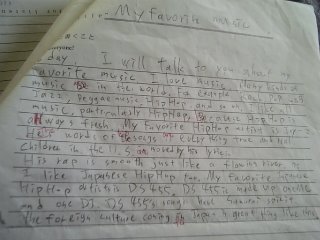 The beginning of the school year here means another 400 speeches for me to attempt to correct. When fortune smiles upon me, I just have countless speeches about club activities with simple grammatical and spelling mistakes to make it through. These depress me terribly, because they prove how terribly depressing most of the kids' lives are - even during summer they spend too much time studying and doing club activities and don't see their friends - but at least I can slog through them. Sometimes I am hit by a paper that is basically indecipherable; it looks like it has been translated word for word from Japanese to English, despite the complete lack of structural affinity of the two languages; it contains bizarre sentences without subjects or objects that I cannot conceive of; it is still written partly in Japanese that I have to then translate. These take much longer to get through, because they often seem to have been penned by Gollum, all sentences with off-putting subjects ("It tires," "It hurts us", "It eats well,") possessing that same structure of a maniacal rant struck down on paper.
The beginning of the school year here means another 400 speeches for me to attempt to correct. When fortune smiles upon me, I just have countless speeches about club activities with simple grammatical and spelling mistakes to make it through. These depress me terribly, because they prove how terribly depressing most of the kids' lives are - even during summer they spend too much time studying and doing club activities and don't see their friends - but at least I can slog through them. Sometimes I am hit by a paper that is basically indecipherable; it looks like it has been translated word for word from Japanese to English, despite the complete lack of structural affinity of the two languages; it contains bizarre sentences without subjects or objects that I cannot conceive of; it is still written partly in Japanese that I have to then translate. These take much longer to get through, because they often seem to have been penned by Gollum, all sentences with off-putting subjects ("It tires," "It hurts us", "It eats well,") possessing that same structure of a maniacal rant struck down on paper.Then there are the fantastic ones like this (Please click on the picture and read). He begins talking about how he loves music, which I appreciate, and then starts talking about how his favorite kind of music is hip-hop. Any kid who doesn't listen to Japanese Pop is cool to me, but then he ups the ante by dropping the name of Jay-Z. The rest of the essay is just pure gold. This is my favorite type of writing I get from students, because it is simply non-reproducible by a native speaker. Freed from an understanding of diction, style, and often grammar itself, and the burdens those things may impose, the Japanese students seem to be able to do things unintentionally with English that are both hilarious and novel.
There are some great lines: "His rap is smooth just like a flowing river," and the songs "have the samurai spirit." But, my favorite part has to be when he writes, "the words of [his] songs [are] everything true and real."
I believe what he meant is, "Everything Jay-Z says in his songs is true and real." But, instead of that stolid phrase, he says the words themselves are everything true and real. He's not talking about the veracity of Jay-Z's experiences, but claiming that the words of Jay-Z represent, perhaps even create, truth and reality in themselves! What made me laugh even more than this, was that it almost sounded like something Jay-Z himself would say; it's the kind of self-aggrandizing lyric a rapper would wish he'd written.
Long story short, I gave this guy high marks and told him I expected a report on the meaning of the song "Girls, Girls, Girls" next week.
Saturday, September 16, 2006
Breaking old promises
 School just started again after the summer break, and I'm getting back into the grind of waking up too early and dragging myself in to dance around for my little English lesson/minstrel show for the students. It being the second year, I'm using the same lessons from last year, so I've got the routine down pat. Like last year, I'm preparing students for a speech contest (more on that later) and grading almost 400 speeches others were required to write for English class.
School just started again after the summer break, and I'm getting back into the grind of waking up too early and dragging myself in to dance around for my little English lesson/minstrel show for the students. It being the second year, I'm using the same lessons from last year, so I've got the routine down pat. Like last year, I'm preparing students for a speech contest (more on that later) and grading almost 400 speeches others were required to write for English class.And so I was in a Starbucks in the city grading these tests when a girl walked up to me and started waving. Lots of students walk or bike by me waving whenever I'm in the city, but, raising my eyes with some suspicion and giving her the quick once-over, I saw that she wasn't wearing a school uniform. This seemed to place her in that dubious category of Japanese that might just wave at me, a complete stranger, just for being tall, white, and red-crested. My interest in Japanese just for their Japanese-ness currently being nil, I decided to ignore her and went back to grading.
But, she as she ran up and yelled, "Mr. Adams!" at me, still waving, I looked closer and saw Mami, the girl I tutored last year for entrance interviews for her university. You know, the one the Vice Principal wanted me to promise not to make fall in love with me. In the end, she passed the interview, was accepted, and went off to Nanzan University in Nagoya to study English. This was the first time I'd talked to her since graduation, so it was really nice to see her. She looked very different outside of school - namely, not in a uniform. I'd say she looked older as well, but that has to be taken relatively, in the sense that most all of the students look like they're 14 anyway so it wouldn't take much to build on that. She and 3 of her friends sat down with me and chatted for a while about their college lives.
Being a bit depressed at teaching the same lame lessons and grading the same boring speeches about club activities, seeing her was exactly what I needed: a reminder of the impact I can have on kid's lives. Not in some vague way about changing their perceptions of foreigners, opening their minds to the wonders of English, or whatever; no, in the definite sense that I got that girl into college. And she's going to remember that, and with something so small I was able to change someone else's life. So the minstrel show will go on, because I've got one more year to get to the rest of those kids.
After talking to her for a while though, it became clear that she's remembering me for other reasons too. Looks like I broke my promise to the Vice Principal after all...
Tuesday, July 18, 2006
Speaking of hostess clubs
A couple times a month I teach an English conversation class on Saturday at the local community center to a small group of mostly elderly students. They're all really nice, aside from being much more motivated and easier to teach than the high school kids I deal with generally.
Since I live a bit away, they take turns each time picking me up to bring me to the center. Last class one of the women from the class came to pick me up and as we drove we chatted a bit. It was a little hard going because though she is basically the worst student in the class, she doesn't want me to speak Japanese. Basically, all the students seem to take any time outside of class with me as a free English lesson, so they're always trying to wring every use out of me possible.
We're talking a bit about my plans for the weekend as we pull into the parking lot. Just as I move to take off my seatbelt though, she taps me on the shoulder and a card suddenly materializes into her hand. I look down and find myself holding a business card from "Pleasure Square" for a certain Rena.
"What's this?" I ask
Her: "A card."
Me: "Who's Rena?"
Her: "Ah...my daughter."
Me: "Wait, wait, your daughter is a hostess!?"
Her: "No, she's not. It's a part-time job."
Me: "Yeah, so she's a hostess part-time."
Her: (Sighs)
Me: "Why are you giving this to me?"
Her: "Well...you should go."
Me: "Umm...sorry, but hostess bars are too expensive for me."
Her: "Yes, weekends are expensive but if you go on Monday it is only 3000 yen."
Me: "I don't know..."
Her: "Go. I told her about you. You'd like her."
And then I got out and taught the class. What was so amusing to me was how she was both embarrassed at her daughter's job but simultaneously trying to drum up more business for her. Unfortunately, aside from the fact that I would not pay anyone for a conversation, looking at this woman, to be bitterly honest, I would especially not pay to talk to her daughter.
Since I live a bit away, they take turns each time picking me up to bring me to the center. Last class one of the women from the class came to pick me up and as we drove we chatted a bit. It was a little hard going because though she is basically the worst student in the class, she doesn't want me to speak Japanese. Basically, all the students seem to take any time outside of class with me as a free English lesson, so they're always trying to wring every use out of me possible.
We're talking a bit about my plans for the weekend as we pull into the parking lot. Just as I move to take off my seatbelt though, she taps me on the shoulder and a card suddenly materializes into her hand. I look down and find myself holding a business card from "Pleasure Square" for a certain Rena.
"What's this?" I ask
Her: "A card."
Me: "Who's Rena?"
Her: "Ah...my daughter."
Me: "Wait, wait, your daughter is a hostess!?"
Her: "No, she's not. It's a part-time job."
Me: "Yeah, so she's a hostess part-time."
Her: (Sighs)
Me: "Why are you giving this to me?"
Her: "Well...you should go."
Me: "Umm...sorry, but hostess bars are too expensive for me."
Her: "Yes, weekends are expensive but if you go on Monday it is only 3000 yen."
Me: "I don't know..."
Her: "Go. I told her about you. You'd like her."
And then I got out and taught the class. What was so amusing to me was how she was both embarrassed at her daughter's job but simultaneously trying to drum up more business for her. Unfortunately, aside from the fact that I would not pay anyone for a conversation, looking at this woman, to be bitterly honest, I would especially not pay to talk to her daughter.
Thursday, June 22, 2006
The "Sublime" of English
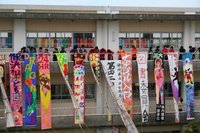 I went to Tokyo for a dreadful re-contracting conference - rife with all the inanity and frustration typical of the bureaucratic JET Program conferences and events - and then we had our school festival shortly afterwards. The school festival is a yearly event in which the all the students participate, both through their homerooms and in their club activities. Each homeroom or club is given a classroom or booth and decides on a theme and some activity. The theme of this year's festival was "The Sublime."
I went to Tokyo for a dreadful re-contracting conference - rife with all the inanity and frustration typical of the bureaucratic JET Program conferences and events - and then we had our school festival shortly afterwards. The school festival is a yearly event in which the all the students participate, both through their homerooms and in their club activities. Each homeroom or club is given a classroom or booth and decides on a theme and some activity. The theme of this year's festival was "The Sublime." The English club was to translate the program for the festival into English. The program contained little descriptions written by students of what each club or homeroom was doing in their area. This simple translation taks became a chore since even in Japanese none of what the kids had written in the program made sense, and it was further complicated by the fact that most every sentence describing the different activities at the festival used the word "Sublime," rendering the entire thing nonsensical.
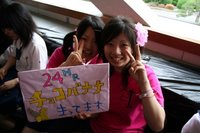 Some selections:
Some selections:24HR "Sublime" Chocolate Bananas: Come taste the "sublime" in bananas!
(The two girls in the picture are advertising their bananas)
Calligraphy club: Has the calligraphy club reached the "sublime" of writing? The answer is...Takashi!
28HR Entrance of a large hall: Tokyo Friend Park! Enter the unknown world inhabited by a mysterious maid
30HR No Goblin!: Throw off your stress and destroy the goblins!
(and my favorite)
39HR Men's Paradise: A world-class paradise for men. We invite you to this world of both fear and laughter
As the program clearly completely fails to convey any idea of what one might find at the booths, the second year students in the English club were also to conduct tours of the festival in English for any foreign visitors. So they would have someone to actually give a tour to on the day, it fell upon me and my well-known contacts in the foreigner community to provide these foreigners who speak English. I brought Matt.
When he arrived, all the girls were busy so we had KMK - I believe I touted his greatness in a previous blog post - give us a solo tour. He took us around and gesticulated wildly at various exhibits.
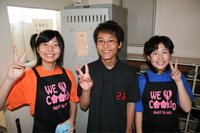 Here is KMK and his harem. KMK actually has a girlfriend in the second year, but since I don't think she's good enough for him, Matt and I kept needling him about going after this first year girl on the right. As the girls here were in the cooking club, Matt played up that angle, while I convinced KMK that this girl had an elegant, rare "old Japan"- type of beauty. He went red and gesticulated in an even wilder fashion - if that can be believed.
Here is KMK and his harem. KMK actually has a girlfriend in the second year, but since I don't think she's good enough for him, Matt and I kept needling him about going after this first year girl on the right. As the girls here were in the cooking club, Matt played up that angle, while I convinced KMK that this girl had an elegant, rare "old Japan"- type of beauty. He went red and gesticulated in an even wilder fashion - if that can be believed.Matt and I also enjoyed going to the biology club's exhibit, where a series of tanks housed various interesting fish and aquatic animals. After listening to the explanation given by the biology club students at each station, we would conduct this dialogue:
 Student: This is a very rare fish.
Student: This is a very rare fish.Me: Hmm...that's very interesting. But let me ask this though, can we eat that fish, now?
Student: Oh oh! No no no no!
Matt: But I'm hungry (rubs stomach) and I want to eat the fish. C'mon buddy.
Student: No no no, I-we-ah ah, need the fish!
Me: Ah, okay okay, I totally understand. You can't give us the fish because you need them for the festival, right?
Student: (Visibly relieved) Yes, yes.
Matt: How about this then, we come back in a couple hours, when you close, and then we eat the fish?
Student: Oh oh no! (waving arms frantically as I reach my hand towards the tank)
We ran through this routine at every tank. Then we took turns distracting the students while we took pictures with our hands in the piranha tank. KMK was going into convulsions at this point.
 We ended up back at the English club's room, where we had set up English karaoke. My laptop was hooked up to a TV and a stereo, playing music videos from a list of songs. The idea was that the first year kids would look up the lyrics for the songs on the internet and put together a booklet of English lyrics for visitors to our room to use. As it turns out though, none of the students were at all capable of doing anything with a computer, even typing the name of a song into Google, so in the end I had to set up the entire thing myself. The room also shut down for large amounts of the day as they would click on the wrong box and had to chase me down to fix the computer. This seemed to be pretty much par for the course though, with all the teachers involved in their homerooms and clubs doing enormously disproportionate amounts of work for something ostensibly to be run entirely by the students for the students.
We ended up back at the English club's room, where we had set up English karaoke. My laptop was hooked up to a TV and a stereo, playing music videos from a list of songs. The idea was that the first year kids would look up the lyrics for the songs on the internet and put together a booklet of English lyrics for visitors to our room to use. As it turns out though, none of the students were at all capable of doing anything with a computer, even typing the name of a song into Google, so in the end I had to set up the entire thing myself. The room also shut down for large amounts of the day as they would click on the wrong box and had to chase me down to fix the computer. This seemed to be pretty much par for the course though, with all the teachers involved in their homerooms and clubs doing enormously disproportionate amounts of work for something ostensibly to be run entirely by the students for the students.  Anyhow, our club event proved less than popular that day, so I also did a disproportionate amount of the singing - though I was less frustrated by that outcome - since even the kids in the club most enthusiastic about the karaoke balked about actually singing in front of others once the time came. In between bouts of my crooning though, KMK stepped up and delivered a surprisingly manly rendition of that O-Zone song, "Dragostea Din Tei"...And no one was left unmoved! I tried to counter by singing A-ha "Take on Me" as a duet with this quiet third-year kid (God knows why he knew all the lyrics), but we just couldn't match KMK's visceral power. It didn't help that my partner for the duet looked like a janitor in his outfit.
Anyhow, our club event proved less than popular that day, so I also did a disproportionate amount of the singing - though I was less frustrated by that outcome - since even the kids in the club most enthusiastic about the karaoke balked about actually singing in front of others once the time came. In between bouts of my crooning though, KMK stepped up and delivered a surprisingly manly rendition of that O-Zone song, "Dragostea Din Tei"...And no one was left unmoved! I tried to counter by singing A-ha "Take on Me" as a duet with this quiet third-year kid (God knows why he knew all the lyrics), but we just couldn't match KMK's visceral power. It didn't help that my partner for the duet looked like a janitor in his outfit.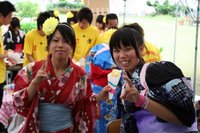 Most all of the kids were wearing their t-shirts for their respective homerooms, and those not in the shirts were all wearing costumes of a sort. The girls in the tea ceremony club wore yukata or kimono, the girls running the host club (more on that later) wore flashy dress shirts and skirts, others wore flowers in their hair.
Most all of the kids were wearing their t-shirts for their respective homerooms, and those not in the shirts were all wearing costumes of a sort. The girls in the tea ceremony club wore yukata or kimono, the girls running the host club (more on that later) wore flashy dress shirts and skirts, others wore flowers in their hair.While the girls seemed to be dressed up in adorable, graceful or (for school) almost indecent clothes, the boys had taken the occasion to voluntarily serve up their pride to the utmost derision, by me and Matt, at least.
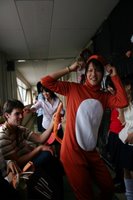 Here is a prime suspect; a 17 year old guy wearing a monkey suit I assume he bought at some store selling little boy's Halloween costumes. Not only was he prancing around in the suit, but he also stopped to pose for this picture with Matt holding onto his tail. I suppose it could be fun for some to see kids taking themselves so lightly, but everyone should have their limits.
Here is a prime suspect; a 17 year old guy wearing a monkey suit I assume he bought at some store selling little boy's Halloween costumes. Not only was he prancing around in the suit, but he also stopped to pose for this picture with Matt holding onto his tail. I suppose it could be fun for some to see kids taking themselves so lightly, but everyone should have their limits. Though fortunately I don't have any pictures of this, there were also a disturbingly high number of boys dressed in drag of one kind or another. I suppose their lack of body hair and general possession of the physique of a prepubescent girl makes them particularly fit for this role, but I still found it rather baffling, aside from just unsettling. Boys wearing kimono, boys wearing girl's school uniforms, boys in tennis skirts, and - by far the most nauseating - a boy in a slit China dress. Ugh... (He danced up to me and asked, "Cute? Cute?" "No," I replied most emphatically, "Just disgusting.") Sorry dude, cross-dressing does not equal instant hilarity.
Though fortunately I don't have any pictures of this, there were also a disturbingly high number of boys dressed in drag of one kind or another. I suppose their lack of body hair and general possession of the physique of a prepubescent girl makes them particularly fit for this role, but I still found it rather baffling, aside from just unsettling. Boys wearing kimono, boys wearing girl's school uniforms, boys in tennis skirts, and - by far the most nauseating - a boy in a slit China dress. Ugh... (He danced up to me and asked, "Cute? Cute?" "No," I replied most emphatically, "Just disgusting.") Sorry dude, cross-dressing does not equal instant hilarity.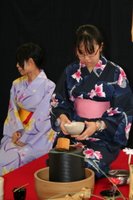 Later, I further fulfilled my bond by bringing a few more friends to get an English tour when Kevin, Joyce, and Yukari showed up. KMK, now joined by his friend, proved himself no more a master of verbal and no less a master of non-verbal communication on his second tour. After a few rounds of karaoke, we stopped by the tea ceremony club to have tea and a snack, and beckoned in by the girls outside, then decided to check out the room that was running a host club.
Later, I further fulfilled my bond by bringing a few more friends to get an English tour when Kevin, Joyce, and Yukari showed up. KMK, now joined by his friend, proved himself no more a master of verbal and no less a master of non-verbal communication on his second tour. After a few rounds of karaoke, we stopped by the tea ceremony club to have tea and a snack, and beckoned in by the girls outside, then decided to check out the room that was running a host club.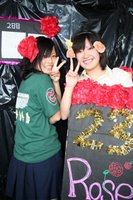 The fact that a host club had been allowed in the festival kind of confused me, since it seemed wildly inappropriate, even as a joke. Host or hostess clubs in Japan are bars where patrons pay to be waited on and surrounded by male or female hosts, respectively. Usually it's a place salarymen go after work to I guess pay to be fawned on and treated as the center of attention after a day of demeaning and humiliating servitude, though recently bars with young men catering to women are becoming popular as well.There is apparently nothing necessarily untoward about it - nothing is being bought except someone's company and time - but it still seems wildly inappropriate to field a mock one at the school festival. I've never gone to a hostess club because I have never had a conversation I would be willing to pay someone for. Let's just say the school's club didn't change my mind on that score.
The fact that a host club had been allowed in the festival kind of confused me, since it seemed wildly inappropriate, even as a joke. Host or hostess clubs in Japan are bars where patrons pay to be waited on and surrounded by male or female hosts, respectively. Usually it's a place salarymen go after work to I guess pay to be fawned on and treated as the center of attention after a day of demeaning and humiliating servitude, though recently bars with young men catering to women are becoming popular as well.There is apparently nothing necessarily untoward about it - nothing is being bought except someone's company and time - but it still seems wildly inappropriate to field a mock one at the school festival. I've never gone to a hostess club because I have never had a conversation I would be willing to pay someone for. Let's just say the school's club didn't change my mind on that score.
Tuesday, June 20, 2006
The Beer Festival
Matt came for another visit on the 25th, just leaving last week on the 13th. By the end, I was tired as hell and sick to boot. Now I think I can write a little about it, weekend by weekend.
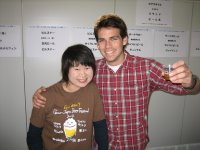 I had already decided on our plan for that first weekend more than a month prior, when while reading the Daily Yomiuiri newspaper I found an article about the Japan Beer Festival. Over 100 Japanese microbrews? We were there before Matt had even finalized his plane ticket.
I had already decided on our plan for that first weekend more than a month prior, when while reading the Daily Yomiuiri newspaper I found an article about the Japan Beer Festival. Over 100 Japanese microbrews? We were there before Matt had even finalized his plane ticket.
So we went to Osaka for the festival and paid 3,000 yen for a 4 hour nomihodai (all you can drink) of more than 100 Japanese craft beers. They tried to handicap us a bit by only providing a 60mL cup, but that proved a futile gesture. Within the first half-hour, we had already sampled all of the beers. By the end of the first hour, we had decided on our favorite brew and taken up permanent residence at their table. By the second hour, Matt had installed himself behind the counter of the brewery booth - despite the continued protests of the woman distributing the samples - and we made a vow to this boisterous Kansai woman that we would drink all of her sample bottles ourselves.
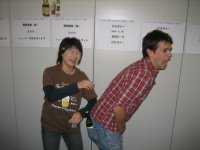 Kansai people - that is, those from the Kansai region of the main island that encompasses Kyoto, Osaka and Kobe - deserve their reputation as a fiery lot though, as you can see in the next picture. As they finally closed the show down and forced us out, we stumbled out with a few souvenir bottles and our skateboards. I think we were able to skate about 10 feet in a looping, parabolic shape before tumbling to the ground. Matt also managed the impressive feat of forgetting he had put this glass bottle in his back pocket, and cut his hand open right good. This would prove to be only the first of many, many falls. Eventually, after we patched him up, we headed off into the city.
Kansai people - that is, those from the Kansai region of the main island that encompasses Kyoto, Osaka and Kobe - deserve their reputation as a fiery lot though, as you can see in the next picture. As they finally closed the show down and forced us out, we stumbled out with a few souvenir bottles and our skateboards. I think we were able to skate about 10 feet in a looping, parabolic shape before tumbling to the ground. Matt also managed the impressive feat of forgetting he had put this glass bottle in his back pocket, and cut his hand open right good. This would prove to be only the first of many, many falls. Eventually, after we patched him up, we headed off into the city.
We skated around the bright lights of Osaka, dodging frightened old women and chatting up various impressed locals. Later we went out for sushi at one of those restaurants with revolving belts, and, though I only vaguely remember this, I believe got kicked out after we started chucking pieces of tuna against the walls to see if they would stick. I guess it was just that kind of night. Eventually we made it back to a hotel.
 The next morning we awoke to find ourselves covered quite evenly with bruises and scrapes. Matt's hand was killing him and I had a nice imprint of a button from my jeans etched into my hip like a head of branded cattle. Pulling it together, we eventually set off to see Himeji, the most impressive castle in Japan. A World Heritage Site, it did not disappoint, to be sure; a massive complex but with a rugged beauty and white exterior that lends it the nickname, the "white heron" castle.
The next morning we awoke to find ourselves covered quite evenly with bruises and scrapes. Matt's hand was killing him and I had a nice imprint of a button from my jeans etched into my hip like a head of branded cattle. Pulling it together, we eventually set off to see Himeji, the most impressive castle in Japan. A World Heritage Site, it did not disappoint, to be sure; a massive complex but with a rugged beauty and white exterior that lends it the nickname, the "white heron" castle.
 The castle is also known for the maze-like path that leads to the main keep. The path circles around in a spiral with many dead ends, leaving any potential attackers open to constant attack from the surrounding walls. Himeji was never actually attacked however, so this design remains untested. I should say, "had never" been attacked, because Matt and I took it upon ourselves to take up the task it seems lesser men wilted at.
The castle is also known for the maze-like path that leads to the main keep. The path circles around in a spiral with many dead ends, leaving any potential attackers open to constant attack from the surrounding walls. Himeji was never actually attacked however, so this design remains untested. I should say, "had never" been attacked, because Matt and I took it upon ourselves to take up the task it seems lesser men wilted at.  Fortunately, this sign's improper use of indefinite articles (climbing "a" wall is prohibited, sure, but how are we to know which wall? It could be any wall, anywhere, right?) left us able to climb without fear of reprisal, as well. I think a young Japanese boy said it best who, after spotting us, cried out "NINJA!" Unfortunately, there were no more samurai sentries left in the castle to come to his aid when I fell upon him like cold, black night, cutting his scream off abruptly with a jab to the windpipe. When in Rome, you know?
Fortunately, this sign's improper use of indefinite articles (climbing "a" wall is prohibited, sure, but how are we to know which wall? It could be any wall, anywhere, right?) left us able to climb without fear of reprisal, as well. I think a young Japanese boy said it best who, after spotting us, cried out "NINJA!" Unfortunately, there were no more samurai sentries left in the castle to come to his aid when I fell upon him like cold, black night, cutting his scream off abruptly with a jab to the windpipe. When in Rome, you know?
 We climbed several flights of steep stairs, pushing aside Japanese women, children, and the elderly in our wake as we made our ascent to the top. I fell prey to one of the other hidden defenses of the castle when I cracked my skull repeatedly on the low hanging doorways throughout the building. I definitely would not be the ideal person to storm a castle in which I would have to stoop down the entire time, leaving my neck generously extended for anyone who happened to have a really sharp sword or two in hand. As always seems to happen when I travel in Japan, I was embarrassed to be tired at the end when I saw how many old women past 70 had made the trek seemingly unfazed.
We climbed several flights of steep stairs, pushing aside Japanese women, children, and the elderly in our wake as we made our ascent to the top. I fell prey to one of the other hidden defenses of the castle when I cracked my skull repeatedly on the low hanging doorways throughout the building. I definitely would not be the ideal person to storm a castle in which I would have to stoop down the entire time, leaving my neck generously extended for anyone who happened to have a really sharp sword or two in hand. As always seems to happen when I travel in Japan, I was embarrassed to be tired at the end when I saw how many old women past 70 had made the trek seemingly unfazed.
 Later that afternoon we dropped in at Kobe - a charming city - and were, as you see here, greeted by many an adoring female admirer. We skated around, soaked up the local color, watched a terrible street band perform, and ate the local specialty, okonomiyaki, which is kind of a pancake with cabbage. We hopped a train back to Hamamatsu that night and laughed at how we had been in three major cities in that one day. In a reoccuring pattern for the trip, I arrived at work the next morning exhausted while Matt went off exploring somewhere else fun. He was, however, always kind enough to call me in between classes to tell me about all the fun places he was visiting. Thanks, buddy.
Later that afternoon we dropped in at Kobe - a charming city - and were, as you see here, greeted by many an adoring female admirer. We skated around, soaked up the local color, watched a terrible street band perform, and ate the local specialty, okonomiyaki, which is kind of a pancake with cabbage. We hopped a train back to Hamamatsu that night and laughed at how we had been in three major cities in that one day. In a reoccuring pattern for the trip, I arrived at work the next morning exhausted while Matt went off exploring somewhere else fun. He was, however, always kind enough to call me in between classes to tell me about all the fun places he was visiting. Thanks, buddy.
 I had already decided on our plan for that first weekend more than a month prior, when while reading the Daily Yomiuiri newspaper I found an article about the Japan Beer Festival. Over 100 Japanese microbrews? We were there before Matt had even finalized his plane ticket.
I had already decided on our plan for that first weekend more than a month prior, when while reading the Daily Yomiuiri newspaper I found an article about the Japan Beer Festival. Over 100 Japanese microbrews? We were there before Matt had even finalized his plane ticket.So we went to Osaka for the festival and paid 3,000 yen for a 4 hour nomihodai (all you can drink) of more than 100 Japanese craft beers. They tried to handicap us a bit by only providing a 60mL cup, but that proved a futile gesture. Within the first half-hour, we had already sampled all of the beers. By the end of the first hour, we had decided on our favorite brew and taken up permanent residence at their table. By the second hour, Matt had installed himself behind the counter of the brewery booth - despite the continued protests of the woman distributing the samples - and we made a vow to this boisterous Kansai woman that we would drink all of her sample bottles ourselves.
 Kansai people - that is, those from the Kansai region of the main island that encompasses Kyoto, Osaka and Kobe - deserve their reputation as a fiery lot though, as you can see in the next picture. As they finally closed the show down and forced us out, we stumbled out with a few souvenir bottles and our skateboards. I think we were able to skate about 10 feet in a looping, parabolic shape before tumbling to the ground. Matt also managed the impressive feat of forgetting he had put this glass bottle in his back pocket, and cut his hand open right good. This would prove to be only the first of many, many falls. Eventually, after we patched him up, we headed off into the city.
Kansai people - that is, those from the Kansai region of the main island that encompasses Kyoto, Osaka and Kobe - deserve their reputation as a fiery lot though, as you can see in the next picture. As they finally closed the show down and forced us out, we stumbled out with a few souvenir bottles and our skateboards. I think we were able to skate about 10 feet in a looping, parabolic shape before tumbling to the ground. Matt also managed the impressive feat of forgetting he had put this glass bottle in his back pocket, and cut his hand open right good. This would prove to be only the first of many, many falls. Eventually, after we patched him up, we headed off into the city.We skated around the bright lights of Osaka, dodging frightened old women and chatting up various impressed locals. Later we went out for sushi at one of those restaurants with revolving belts, and, though I only vaguely remember this, I believe got kicked out after we started chucking pieces of tuna against the walls to see if they would stick. I guess it was just that kind of night. Eventually we made it back to a hotel.
 The next morning we awoke to find ourselves covered quite evenly with bruises and scrapes. Matt's hand was killing him and I had a nice imprint of a button from my jeans etched into my hip like a head of branded cattle. Pulling it together, we eventually set off to see Himeji, the most impressive castle in Japan. A World Heritage Site, it did not disappoint, to be sure; a massive complex but with a rugged beauty and white exterior that lends it the nickname, the "white heron" castle.
The next morning we awoke to find ourselves covered quite evenly with bruises and scrapes. Matt's hand was killing him and I had a nice imprint of a button from my jeans etched into my hip like a head of branded cattle. Pulling it together, we eventually set off to see Himeji, the most impressive castle in Japan. A World Heritage Site, it did not disappoint, to be sure; a massive complex but with a rugged beauty and white exterior that lends it the nickname, the "white heron" castle.  The castle is also known for the maze-like path that leads to the main keep. The path circles around in a spiral with many dead ends, leaving any potential attackers open to constant attack from the surrounding walls. Himeji was never actually attacked however, so this design remains untested. I should say, "had never" been attacked, because Matt and I took it upon ourselves to take up the task it seems lesser men wilted at.
The castle is also known for the maze-like path that leads to the main keep. The path circles around in a spiral with many dead ends, leaving any potential attackers open to constant attack from the surrounding walls. Himeji was never actually attacked however, so this design remains untested. I should say, "had never" been attacked, because Matt and I took it upon ourselves to take up the task it seems lesser men wilted at.  Fortunately, this sign's improper use of indefinite articles (climbing "a" wall is prohibited, sure, but how are we to know which wall? It could be any wall, anywhere, right?) left us able to climb without fear of reprisal, as well. I think a young Japanese boy said it best who, after spotting us, cried out "NINJA!" Unfortunately, there were no more samurai sentries left in the castle to come to his aid when I fell upon him like cold, black night, cutting his scream off abruptly with a jab to the windpipe. When in Rome, you know?
Fortunately, this sign's improper use of indefinite articles (climbing "a" wall is prohibited, sure, but how are we to know which wall? It could be any wall, anywhere, right?) left us able to climb without fear of reprisal, as well. I think a young Japanese boy said it best who, after spotting us, cried out "NINJA!" Unfortunately, there were no more samurai sentries left in the castle to come to his aid when I fell upon him like cold, black night, cutting his scream off abruptly with a jab to the windpipe. When in Rome, you know? We climbed several flights of steep stairs, pushing aside Japanese women, children, and the elderly in our wake as we made our ascent to the top. I fell prey to one of the other hidden defenses of the castle when I cracked my skull repeatedly on the low hanging doorways throughout the building. I definitely would not be the ideal person to storm a castle in which I would have to stoop down the entire time, leaving my neck generously extended for anyone who happened to have a really sharp sword or two in hand. As always seems to happen when I travel in Japan, I was embarrassed to be tired at the end when I saw how many old women past 70 had made the trek seemingly unfazed.
We climbed several flights of steep stairs, pushing aside Japanese women, children, and the elderly in our wake as we made our ascent to the top. I fell prey to one of the other hidden defenses of the castle when I cracked my skull repeatedly on the low hanging doorways throughout the building. I definitely would not be the ideal person to storm a castle in which I would have to stoop down the entire time, leaving my neck generously extended for anyone who happened to have a really sharp sword or two in hand. As always seems to happen when I travel in Japan, I was embarrassed to be tired at the end when I saw how many old women past 70 had made the trek seemingly unfazed. Later that afternoon we dropped in at Kobe - a charming city - and were, as you see here, greeted by many an adoring female admirer. We skated around, soaked up the local color, watched a terrible street band perform, and ate the local specialty, okonomiyaki, which is kind of a pancake with cabbage. We hopped a train back to Hamamatsu that night and laughed at how we had been in three major cities in that one day. In a reoccuring pattern for the trip, I arrived at work the next morning exhausted while Matt went off exploring somewhere else fun. He was, however, always kind enough to call me in between classes to tell me about all the fun places he was visiting. Thanks, buddy.
Later that afternoon we dropped in at Kobe - a charming city - and were, as you see here, greeted by many an adoring female admirer. We skated around, soaked up the local color, watched a terrible street band perform, and ate the local specialty, okonomiyaki, which is kind of a pancake with cabbage. We hopped a train back to Hamamatsu that night and laughed at how we had been in three major cities in that one day. In a reoccuring pattern for the trip, I arrived at work the next morning exhausted while Matt went off exploring somewhere else fun. He was, however, always kind enough to call me in between classes to tell me about all the fun places he was visiting. Thanks, buddy.
Sunday, June 18, 2006
The School "Excursion"
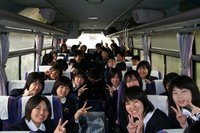 For several weeks previous, anticipation had been building for our "school excursion", to which I was invited along. For some reason, this is the English translation of the word ensoku that apparently every Japanese learns in English class. Hearing teachers talk about this excursion business made me rather excited about what we might do. However, it seems that rather than "excursion" - which conjures up images of some voyage into jungle primeval, trek across the frozen tundra of the Far North, or perilous attempt at the summit of some great slag of rock - it turns out it would be much more accurate to render the word as "field trip", with all the banality that term usually conveys.
For several weeks previous, anticipation had been building for our "school excursion", to which I was invited along. For some reason, this is the English translation of the word ensoku that apparently every Japanese learns in English class. Hearing teachers talk about this excursion business made me rather excited about what we might do. However, it seems that rather than "excursion" - which conjures up images of some voyage into jungle primeval, trek across the frozen tundra of the Far North, or perilous attempt at the summit of some great slag of rock - it turns out it would be much more accurate to render the word as "field trip", with all the banality that term usually conveys.For banal our field trip was. All students in all homerooms of all three grade levels were loaded off into buses in the morning, each grade bound for a different exciting location, one homeroom per chartered bus. Since I'm teaching first-year students mostly, I opted to go along with the intrepid explorers of 14 HR. Due to rain that morning, a trip to a historic village and hiking was called off in favor of a visit to the Toyota Museum. I thought it might still be fun though, since some of the greatest art to be seen in Japan is owned by various corporations.
A 2-hour bus ride later, I discovered that this was not, as I had assumed, a museum of art owned by the Toyota corporation, but in fact a museum of Toyota cars. As in, a car museum. As in, a museum about the history of the automobile. As in, line after line of cars with placards in front of them. Kind of like going on a field trip to the exotic "Mile of Cars."
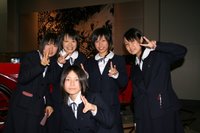 Look at the expression on the girl's face in the front in this picture. That's how we all felt. Upon our entrance, we were given about an hour to walk around and enjoy the exhibits. I finished my cursory walk around with some students in about 5 minutes. I gave a personal tour to the kids with commentary: "And here on your right, you will see...another car. And if you walk a little farther, coming up on your left is...this other car. Ah, now we've come to my favorite part of the entire tour - the part where we can all look at this car. Isn't this a particularly fascinating car?" Then I pretended to take an exhaustive series of pictures of the car in question. The tour was over in 5 minutes because I couldn't even amuse myself for that long, and I find myself quite amusing usually. I still can't believe we went to a car museum, but I guess it's hard to find a place to just throw a couple hundred kids in for hours at a time.
Look at the expression on the girl's face in the front in this picture. That's how we all felt. Upon our entrance, we were given about an hour to walk around and enjoy the exhibits. I finished my cursory walk around with some students in about 5 minutes. I gave a personal tour to the kids with commentary: "And here on your right, you will see...another car. And if you walk a little farther, coming up on your left is...this other car. Ah, now we've come to my favorite part of the entire tour - the part where we can all look at this car. Isn't this a particularly fascinating car?" Then I pretended to take an exhaustive series of pictures of the car in question. The tour was over in 5 minutes because I couldn't even amuse myself for that long, and I find myself quite amusing usually. I still can't believe we went to a car museum, but I guess it's hard to find a place to just throw a couple hundred kids in for hours at a time. After a long lunch, we still had too much time leftover to just go back to school, so we headed to Nagoya to see Nagoya Castle. One teacher, noting my disappointed look leftover from the last stop, tried to buoy my spirits a little by talking up the castle. Unfortunately, I'd been there twice already, and that was already two times too many. Nagoya Castle is a reconstruction, and like many Japanese reconstructions, it's now a concrete edifice lacking any charm, soul, or real historical merit. Not only is the entire castle fake, essentially, but it's not even attempting to be an authentic fake; the rooms have all been replaced with lame exhibits on the castle's history and the center is hollowed out with a modern staircase and elevator. Once you pass within the imposing gates, it's a lot like walking around some public library built in the 50's. Sometimes I really think the Japanese have a gift for ruining their own historical sites.
After a long lunch, we still had too much time leftover to just go back to school, so we headed to Nagoya to see Nagoya Castle. One teacher, noting my disappointed look leftover from the last stop, tried to buoy my spirits a little by talking up the castle. Unfortunately, I'd been there twice already, and that was already two times too many. Nagoya Castle is a reconstruction, and like many Japanese reconstructions, it's now a concrete edifice lacking any charm, soul, or real historical merit. Not only is the entire castle fake, essentially, but it's not even attempting to be an authentic fake; the rooms have all been replaced with lame exhibits on the castle's history and the center is hollowed out with a modern staircase and elevator. Once you pass within the imposing gates, it's a lot like walking around some public library built in the 50's. Sometimes I really think the Japanese have a gift for ruining their own historical sites.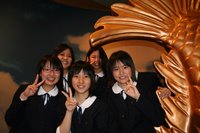 Still, we managed to have some fun. It was a good chance for me to interact with the students outside of a school setting - although they were still wearing their uniforms. These girls walked around with this other teacher (the young tennis coach) and I most of the day. The tour of the castle didn't take much more time than the museum, so we hung out in the shade and ate ice cream. I chatted with kids in Japanese - it was their day off, after all - took lots of pictures, let them try on my sunglasses; the usual.
Still, we managed to have some fun. It was a good chance for me to interact with the students outside of a school setting - although they were still wearing their uniforms. These girls walked around with this other teacher (the young tennis coach) and I most of the day. The tour of the castle didn't take much more time than the museum, so we hung out in the shade and ate ice cream. I chatted with kids in Japanese - it was their day off, after all - took lots of pictures, let them try on my sunglasses; the usual. 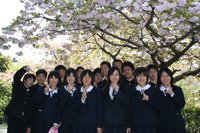 In the end, of course, the destination is not so important for the trips here, because it's more about fostering bonds between members of homeroom classes. The school system prepares kids for a place in Japanese society by emulating it on a smaller scale with the bonds formed as a class. Just like the sports festival, it encourages a sense of (and need for) belonging to a social group bigger than oneself. Even by the end of just one day trip, I could see this in the kids in my group and others.
In the end, of course, the destination is not so important for the trips here, because it's more about fostering bonds between members of homeroom classes. The school system prepares kids for a place in Japanese society by emulating it on a smaller scale with the bonds formed as a class. Just like the sports festival, it encourages a sense of (and need for) belonging to a social group bigger than oneself. Even by the end of just one day trip, I could see this in the kids in my group and others.We eventually piled back onto the buses for another couple hour ride back to school. By my estimation, we spent about 5 hours on the bus that day, and only a little over a 2 hours actually walking around.
"Excursion" my ass.
Wednesday, May 17, 2006
A refreshing new approach to English Literature
I had several friends at Waseda who were majoring in English literature. On first meeting them, I was very excited to meet some people with common interests, and maybe they would have an entirely different viewpoint on works in the canon. So, I asked:
"You're an English literature major, right?"
"Yes."
"So, who is your favorite author?"
[Confused look]
"Ah...I don't know?"
"Okay...what's your favorite book then?"
[Still confused]
"Ah...I don't know?"
"Well...what's a book you like then?
"Ah...-"
"-Yeah, you don't know, I get it."
This puzzled me at the time, but I wrote it off as just a problem with the intellectual laziness of my particular friends. Recently though, I've come to realize that of the many English teachers at my school - several of whom were English lit majors - none could name any book they particularly enjoyed. As it turns out, there was a perfectly reasonable explanation for why a person majoring in English literature could be without either a favorite author or book, or really, even a book they liked. You see, English literature majors at Japanese colleges don't really read books.
Let me emphasize that:
English literature majors in Japan don't read books.
If you study English literature here, it seems you are not required to actually read a book written in English. You are not even really required to read a chapter of a book. What you do is go to class and, along with a teacher, analyze a small excerpt, say a page or so, from a book. I mean "analyze" of course, not in the sense of "examine methodically and in detail for the purpose of explanation and interpretation." No no, not in the sense of "literary analysis" I mean "analyze" in the sense of "resolve a sentence into its grammatical elements," or, more succinctly, "parse." This in mind, it could be argued that you are not even required to actually read anything.
So what? Well, the only purpose of studying a language - or speaking a language, for that matter - is for communication, and one studies a foreign language to open new paths and modes of communication unavailable in one's native tongue. This communication is either verbal or written, so we are either talking to one another in another language, or we are reading something written in another language.
I love speaking Japanese. To me, there is a vast difference between what I can say and how I speak in English versus Japanese (not just related to my linguistic insufficiences in Japanese or over-efficiencies in English) It's fascinating, and a hell of a lot of fun to talk to people in Japanese and come to see the differences in the languages and how they both control and sometimes constrain how we communicate.
I love Japanese literature. That was, of course, the whole reason I started learning Japanese in the first place; I wanted to read some of my favorite novels in the original language. At UCLA, I read those novels, modern work and poetry, and even learned Classical Japanese (kind of like Middle English to Modern English) so I could read poems more than a thousand years old. I found that any translation of the work was a pale copy stripped of much of what made it "literature" in the first place, especially between languages so disparate. Haiku in English are a joke:
Ancient pond/Frog jumps in/Sound of water
It's crap, right? Yet this is a famous, great poem in Japanese. Now imagine Shakespeare translated into a language without definite or indefinite articles, or translating Salinger into a language without sarcasm.
As I think I've said many times before though, Japanese schools don't emphasize speaking at all. Everything is geared towards preparation for entrance examinations that test only obscure grammar knowledge, and so teachers just hammer home lessons on syntax and vocabulary. In a way, it's fortunate that they just teach grammar points though, because they usually can't speak English. Even the best teachers rarely speak better English than I do Japanese, and they've got at least 10 years on me.
So most teachers are dismal speakers, of course partly because they are products of the same educational system, but also because they don't try to improve their English. They don't actually try to speak English with others, because they don't seem to see the point. If they were sincerely interested in communicating, they'd be better at it. But then again, to really know the benefit, you'd have to actually speak with others. And these same people who don't enjoy speaking English also don't enjoy reading English.
So what can you possibly get out of a foreign language like English, if you don't want to speak or read it? What pleasure can you get from NOT being able to communicate your feelings or understand those of others? What new worlds or modes of thought can be opened by NOT ever reading anything the way it was written? Well, succinctly, you get NOTHING.
And so, we have a system full of teachers who don't even appreciate the whole point of learning a language teaching a bunch of people who are instinctively prone to not appreciating the point of learning anything; ie: teenagers. How can these sort of teachers ever impart any meaning to the study if they themselves cannot recognize the value? Why should their students, how could their students be expected to care about the subject if none of the teachers do?
Well, they can't. And all signs suggest that they don't.
Despite a kind of national past-time of studying English, nobody I've met looks back on their high school classes fondly. I gave a survey to all 400 first-year students this year and the last, and in response to the question "do you like English class?" more than 60% answer "No." Seeing as the students handed in these surveys to me personally with their names attached, I'd venture to say that some were too timid to be honest, so the actual number of students who don't enjoy English is probably above 80%. The reasons are fairly constant; the grammar doesn't make sense, there are too many words, spelling is too difficult. Certainly, these things are true, but should they be reason alone to hate a language?
But what reasons are there for them to like the language? I can't blame my students for not caring, because I'd hate English too if I were them, and I certainly never would have studied Japanese if someone who doesn't speak, read, or enjoy the language had purported to teach me.
"You're an English literature major, right?"
"Yes."
"So, who is your favorite author?"
[Confused look]
"Ah...I don't know?"
"Okay...what's your favorite book then?"
[Still confused]
"Ah...I don't know?"
"Well...what's a book you like then?
"Ah...-"
"-Yeah, you don't know, I get it."
This puzzled me at the time, but I wrote it off as just a problem with the intellectual laziness of my particular friends. Recently though, I've come to realize that of the many English teachers at my school - several of whom were English lit majors - none could name any book they particularly enjoyed. As it turns out, there was a perfectly reasonable explanation for why a person majoring in English literature could be without either a favorite author or book, or really, even a book they liked. You see, English literature majors at Japanese colleges don't really read books.
Let me emphasize that:
English literature majors in Japan don't read books.
If you study English literature here, it seems you are not required to actually read a book written in English. You are not even really required to read a chapter of a book. What you do is go to class and, along with a teacher, analyze a small excerpt, say a page or so, from a book. I mean "analyze" of course, not in the sense of "examine methodically and in detail for the purpose of explanation and interpretation." No no, not in the sense of "literary analysis" I mean "analyze" in the sense of "resolve a sentence into its grammatical elements," or, more succinctly, "parse." This in mind, it could be argued that you are not even required to actually read anything.
So what? Well, the only purpose of studying a language - or speaking a language, for that matter - is for communication, and one studies a foreign language to open new paths and modes of communication unavailable in one's native tongue. This communication is either verbal or written, so we are either talking to one another in another language, or we are reading something written in another language.
I love speaking Japanese. To me, there is a vast difference between what I can say and how I speak in English versus Japanese (not just related to my linguistic insufficiences in Japanese or over-efficiencies in English) It's fascinating, and a hell of a lot of fun to talk to people in Japanese and come to see the differences in the languages and how they both control and sometimes constrain how we communicate.
I love Japanese literature. That was, of course, the whole reason I started learning Japanese in the first place; I wanted to read some of my favorite novels in the original language. At UCLA, I read those novels, modern work and poetry, and even learned Classical Japanese (kind of like Middle English to Modern English) so I could read poems more than a thousand years old. I found that any translation of the work was a pale copy stripped of much of what made it "literature" in the first place, especially between languages so disparate. Haiku in English are a joke:
Ancient pond/Frog jumps in/Sound of water
It's crap, right? Yet this is a famous, great poem in Japanese. Now imagine Shakespeare translated into a language without definite or indefinite articles, or translating Salinger into a language without sarcasm.
As I think I've said many times before though, Japanese schools don't emphasize speaking at all. Everything is geared towards preparation for entrance examinations that test only obscure grammar knowledge, and so teachers just hammer home lessons on syntax and vocabulary. In a way, it's fortunate that they just teach grammar points though, because they usually can't speak English. Even the best teachers rarely speak better English than I do Japanese, and they've got at least 10 years on me.
So most teachers are dismal speakers, of course partly because they are products of the same educational system, but also because they don't try to improve their English. They don't actually try to speak English with others, because they don't seem to see the point. If they were sincerely interested in communicating, they'd be better at it. But then again, to really know the benefit, you'd have to actually speak with others. And these same people who don't enjoy speaking English also don't enjoy reading English.
So what can you possibly get out of a foreign language like English, if you don't want to speak or read it? What pleasure can you get from NOT being able to communicate your feelings or understand those of others? What new worlds or modes of thought can be opened by NOT ever reading anything the way it was written? Well, succinctly, you get NOTHING.
And so, we have a system full of teachers who don't even appreciate the whole point of learning a language teaching a bunch of people who are instinctively prone to not appreciating the point of learning anything; ie: teenagers. How can these sort of teachers ever impart any meaning to the study if they themselves cannot recognize the value? Why should their students, how could their students be expected to care about the subject if none of the teachers do?
Well, they can't. And all signs suggest that they don't.
Despite a kind of national past-time of studying English, nobody I've met looks back on their high school classes fondly. I gave a survey to all 400 first-year students this year and the last, and in response to the question "do you like English class?" more than 60% answer "No." Seeing as the students handed in these surveys to me personally with their names attached, I'd venture to say that some were too timid to be honest, so the actual number of students who don't enjoy English is probably above 80%. The reasons are fairly constant; the grammar doesn't make sense, there are too many words, spelling is too difficult. Certainly, these things are true, but should they be reason alone to hate a language?
But what reasons are there for them to like the language? I can't blame my students for not caring, because I'd hate English too if I were them, and I certainly never would have studied Japanese if someone who doesn't speak, read, or enjoy the language had purported to teach me.
Saturday, May 13, 2006
Chocoretto
 Last October I taught a class to all the first year students about Halloween. As part of that class, I handed out some candy to the students who finished the Halloween-themed activity the quickest. I thought this would just be a nice one-time treat for the kids. But since that day, I have been hounded by a small cadre of girls with only one thing on their minds:
Last October I taught a class to all the first year students about Halloween. As part of that class, I handed out some candy to the students who finished the Halloween-themed activity the quickest. I thought this would just be a nice one-time treat for the kids. But since that day, I have been hounded by a small cadre of girls with only one thing on their minds:Chocolate!!
And, only one English phrase in those minds:
"Give me chocolate!!"
Everytime I pass one of these girls in the hallway, the exchange goes as follows:
Girl: (Waving in my face) "Harrow Mistah Adamusuuu!"
[Students seem to really enjoy drawing out the last syllable of my name]
Me: "Hey. What's up?"
Girl: (Now waving an open palm in my face) "Give me chocoretto!"
Me: (Shaking my head and laughing) "Sorry, I don't carry chocolate around all the time."
She stares for a second at me blankly, tilting her face to the side in a way reminiscent of the cock of the head of a confused labrador. After a few seconds, however, she snaps her fingers and smiles.
Girl: "Ahaaa, yes yes...I understand. Mistah Adamusuuu, give me chocoretto PLEASE!"
Me: (Rolling my eyes)
The path this usually takes is me heading back to my desk with the girl or girls in tow. At this point, I have turned this into a sort of conversation exchange in which I ask them to explain why should receive chocolate. Usually, this invokes an answer like, "Because I need it, Mr. Adams." This is so hilariously - and unintentionally - sexual that I never fail to laugh. If they can speak to me in English for a bit, I'll toss them a Hershey's Kiss. Reminiscent of how one might toss a treat to a labrador. I'm not sure whether this is a form of enabling or training, really.
The spectacle of this steady procession of demanding girls to my desk tends to amuse the surrounding teachers. The sarcastic female teacher thumbs her nose at their "disgusting, grabby little paws," but still smirks. The Beach Boys Sensei, however, just sighs, and pronounces somberly:
"They're like the girls begging American soldiers for chocolate after the war."
This is a joke, though it takes me a few seconds of looking him in the eyes to know for sure, and a few more to know for sure whether I am really allowed to laugh at it.
Wednesday, May 10, 2006
Situational morality in Japan
The younger kendo guy's wife is giving her husband and I a ride, along with the English teacher who hates his job and loves to curse. As we pull up to a red light at the intersection of a major highway, the wife points out that in the lane next to us going the other way, a large chunk of heavy plastic - something that might have fallen of a truck - is sitting in the middle of the road. It's not immoveable or particularly dangerous by itself, but certainly enough to cause an accident if jammed in a wheelwell. "Wow, that's really dangerous!" they all agree. As we watch, a car making a turn onto the road nearly runs over it, barely swerving at the last second to avoid it. The three adults in the car are still watching, rapt. That is, just watching. I am sitting on the left side of the car and so (roads being backwards in Japan) on the opposite side from where this is happening. I look over at the the teacher sitting on my right, waiting for him to do something. He in turn looks out the window and exclaims, "Yeah, that is really dangerous, isn't it?" Then he turns his head right back around. Nobody makes a move.
Finally, it is abundantly clear to me that nobody is going to do anything about this, so I check the light, tell them not to drive away, and open my door. I walk around the back of the car, pick up the hunk of whatever the hell it was and chuck it off the road. As I walk back around the car I see the person behind us eyes-wide in a state of shock after witnessing what I just did. Getting back into the car, the three inside start clapping, crying out "Sugoi! Sugoi!" ("Amazing!") I shake my head, because it's nothing I should be applauded for, it's something that a person should do; to me, really something they should be punished for not doing.
This was a particularly glaring example for me of the difference between my Western morality and that of the ordinary Japanese. Our morality is unconditional, a kind of categorical morality. Things are either morally right or they are morally wrong, though we often disagree as to what is which. In the Judeo-Christian ethic, those ideals of right and wrong were traditionally laid down by God, but they could just as easily be understood in a secular, philosophical sense. The point is that widely, our society works on the basis that there are universal things that we take to be right and wrong, and we act accordingly, bound by these rules individually. In this particular case, it would be wrong for me to watch while some innocent person was harmed. We deal in absolutes.
But, the Japanese morality is not absolute, it is situational. Japanese society is based on relationships to others. The very word in Japanese used to mean "human being" in Japanese, 人間 (ningen), is written with two kanji characters that mean "person" and "between" respectively, giving the word the loose meaning of "between people." A person is what lies between others; more directly, a person is defined by their relationships to others. Traditionally, this would be the Confucian relationships between parents and children, adults and rulers etc. Now, it would encompass the family, friends, classmates at school or coworkers. One basically is identified through these groups- but not only passively, actively; students and teachers at school introduce themselves as "Hamamatsu Minami High School's So-and-So," workers at a company might say something that literally translates as "I'm Japan Airlines' Maiko Iba." (ha)
I used to wonder why Japanese schoolchildren wear uniforms; in the US I thought they were either for religious schools or those with disciplinary problems. Neither is really an issue in Japan (well, discipline would be a problem in some schools but certainly not a high level one like where I teach). I could see how they work to crush individuality, but it seemed like they're doing such a great job of that every day in class already that uniforms are quite superfluous in that respect. I was even more confused as to why kids would wear their uniforms even on weekends and vacations when they didn't have class. Understood in the context of the social structure however, it makes perfect sense. Kids wear uniforms to identify themselves as part of a group - students - and, in fact, the uniforms of particular schools are easily distinguishable, making even further stratification possible. Even the suit of the salaryman - or Japanese businessman - can be another group marker. People's lives seem determined by this "inside" and "outside" dynamic.
As belonging to a group is how a person is defined, so their value within that group is defined by their behavior within. Largely, one's life is supposed to revolve around living within these social circles and cultivating relationships, I suppose. People are bound to correct behavior based on their obligations and connections to others. The constant consideration of others that this necessitates accounts for the fabled courtesy and politeness of the Japanese. That's the upside.
The downside, is what happens when another person is not within this inside circle. That is, what happens when you have no connection to another person, and so no real societal obligations to them?
Think of the car itself as a functioning example of this "inside" and "outside" concept. The people inside the car can watch something happening outside with a sort of moral distance because they have no connection or obligation to those not inside the car. They don't know them, they don't work with them, they've never met them. If someone inside their circle were to be in danger, they should act, but outside of that, there is no bond placed upon them in this situation. To me, it doesn't matter that I don't know those who might be affected, the fact is simply that it is wrong to allow others to potentially be hurt due to ones own inaction. That is, my action stems from a morality based on universal imperatives that decide what is right and wrong, while their morality is situational. When taken outside of a situation, it often ceases to operate or decide behavior. This is not to say that some Japanese people wouldn't help, just that no one is expected to help, or would be judged for not helping. The formality that drives the decisions on moral behavior is what makes the fabled politeness of Japanese people to me chilling, as is not really politeness in our sense at all.
There's an expression in Japanese that aptly describes the situation: "The traveler discards all shame." Japanese tourists are regularly much more rude and ill-behaved when traveling in foreign countries than they ever would be in Japan, because leaving the country frees them from their societal obligations towards others. This detachment has been pegged as one characteristic that made some of the Japanese soldiers in WWII so able to committ heinous and dehumanizing acts against the peoples of Korea and China. The Japanese were free from the bounds of their country and its expectations, and the other Asians did not belong to this inner group of Japanese that would accord them fair treatment, but instead basically existed outside in an area in which actions against them were held to no moral standard.
This is not to suggest, of course, that the Japanese are somehow alone in the tendency to marginalize connections to another group in order to easily ignore basic human obligations to one another; this is obviously a constant underlying all aspects of abusive behavior within human civilization, from petty racism to genocide. I am, however, particularly struck by how dangerously open their society leaves them to this sort of moral ambiguity. If they can ignore another Japanese person in such a cavalier way simply because they don't belong to one of the same social circles, imagine the possible attitudes one could have against foreigners, who are basically not even placed in the same circle of humanity as the Japanese themselves.
My three friends in the car are, to me, incredibly kind people. The two teachers work tirelessly to help their students succeed, and if I needed their help, they would no doubt be there. But, it's precisely this fact that makes such an innocuous event so unnerving to me. When these things happen, I feel as though my basic assumptions of human nature have been shattered.
Finally, it is abundantly clear to me that nobody is going to do anything about this, so I check the light, tell them not to drive away, and open my door. I walk around the back of the car, pick up the hunk of whatever the hell it was and chuck it off the road. As I walk back around the car I see the person behind us eyes-wide in a state of shock after witnessing what I just did. Getting back into the car, the three inside start clapping, crying out "Sugoi! Sugoi!" ("Amazing!") I shake my head, because it's nothing I should be applauded for, it's something that a person should do; to me, really something they should be punished for not doing.
This was a particularly glaring example for me of the difference between my Western morality and that of the ordinary Japanese. Our morality is unconditional, a kind of categorical morality. Things are either morally right or they are morally wrong, though we often disagree as to what is which. In the Judeo-Christian ethic, those ideals of right and wrong were traditionally laid down by God, but they could just as easily be understood in a secular, philosophical sense. The point is that widely, our society works on the basis that there are universal things that we take to be right and wrong, and we act accordingly, bound by these rules individually. In this particular case, it would be wrong for me to watch while some innocent person was harmed. We deal in absolutes.
But, the Japanese morality is not absolute, it is situational. Japanese society is based on relationships to others. The very word in Japanese used to mean "human being" in Japanese, 人間 (ningen), is written with two kanji characters that mean "person" and "between" respectively, giving the word the loose meaning of "between people." A person is what lies between others; more directly, a person is defined by their relationships to others. Traditionally, this would be the Confucian relationships between parents and children, adults and rulers etc. Now, it would encompass the family, friends, classmates at school or coworkers. One basically is identified through these groups- but not only passively, actively; students and teachers at school introduce themselves as "Hamamatsu Minami High School's So-and-So," workers at a company might say something that literally translates as "I'm Japan Airlines' Maiko Iba." (ha)
I used to wonder why Japanese schoolchildren wear uniforms; in the US I thought they were either for religious schools or those with disciplinary problems. Neither is really an issue in Japan (well, discipline would be a problem in some schools but certainly not a high level one like where I teach). I could see how they work to crush individuality, but it seemed like they're doing such a great job of that every day in class already that uniforms are quite superfluous in that respect. I was even more confused as to why kids would wear their uniforms even on weekends and vacations when they didn't have class. Understood in the context of the social structure however, it makes perfect sense. Kids wear uniforms to identify themselves as part of a group - students - and, in fact, the uniforms of particular schools are easily distinguishable, making even further stratification possible. Even the suit of the salaryman - or Japanese businessman - can be another group marker. People's lives seem determined by this "inside" and "outside" dynamic.
As belonging to a group is how a person is defined, so their value within that group is defined by their behavior within. Largely, one's life is supposed to revolve around living within these social circles and cultivating relationships, I suppose. People are bound to correct behavior based on their obligations and connections to others. The constant consideration of others that this necessitates accounts for the fabled courtesy and politeness of the Japanese. That's the upside.
The downside, is what happens when another person is not within this inside circle. That is, what happens when you have no connection to another person, and so no real societal obligations to them?
Think of the car itself as a functioning example of this "inside" and "outside" concept. The people inside the car can watch something happening outside with a sort of moral distance because they have no connection or obligation to those not inside the car. They don't know them, they don't work with them, they've never met them. If someone inside their circle were to be in danger, they should act, but outside of that, there is no bond placed upon them in this situation. To me, it doesn't matter that I don't know those who might be affected, the fact is simply that it is wrong to allow others to potentially be hurt due to ones own inaction. That is, my action stems from a morality based on universal imperatives that decide what is right and wrong, while their morality is situational. When taken outside of a situation, it often ceases to operate or decide behavior. This is not to say that some Japanese people wouldn't help, just that no one is expected to help, or would be judged for not helping. The formality that drives the decisions on moral behavior is what makes the fabled politeness of Japanese people to me chilling, as is not really politeness in our sense at all.
There's an expression in Japanese that aptly describes the situation: "The traveler discards all shame." Japanese tourists are regularly much more rude and ill-behaved when traveling in foreign countries than they ever would be in Japan, because leaving the country frees them from their societal obligations towards others. This detachment has been pegged as one characteristic that made some of the Japanese soldiers in WWII so able to committ heinous and dehumanizing acts against the peoples of Korea and China. The Japanese were free from the bounds of their country and its expectations, and the other Asians did not belong to this inner group of Japanese that would accord them fair treatment, but instead basically existed outside in an area in which actions against them were held to no moral standard.
This is not to suggest, of course, that the Japanese are somehow alone in the tendency to marginalize connections to another group in order to easily ignore basic human obligations to one another; this is obviously a constant underlying all aspects of abusive behavior within human civilization, from petty racism to genocide. I am, however, particularly struck by how dangerously open their society leaves them to this sort of moral ambiguity. If they can ignore another Japanese person in such a cavalier way simply because they don't belong to one of the same social circles, imagine the possible attitudes one could have against foreigners, who are basically not even placed in the same circle of humanity as the Japanese themselves.
My three friends in the car are, to me, incredibly kind people. The two teachers work tirelessly to help their students succeed, and if I needed their help, they would no doubt be there. But, it's precisely this fact that makes such an innocuous event so unnerving to me. When these things happen, I feel as though my basic assumptions of human nature have been shattered.
Thursday, April 27, 2006
A picture instead of a thousand words
If you look on the right of the page you should now see a link to my Flickr site. I've posted some shots I've taken that I think are worth looking at, and since I've gotten myself a fancy new camera, expect more photos up here soon. At least, photos soon relative to posting on the blog.
Wednesday, April 19, 2006
Back to school...
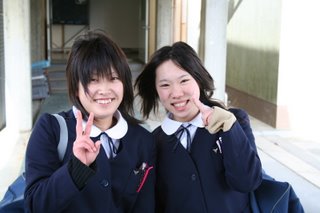 It's the first full week of class now at Hamamatsu Minami, and I'm already exhausted.
It's the first full week of class now at Hamamatsu Minami, and I'm already exhausted. I had finally established a relationship with a lot of students and teachers at the school. Kids knew me and I knew them, and I was settling into a real place at school. But in Japan the school year starts in April, so all the older kids move on and I get to meet a whole new year of incoming students. All the older students had finally gotten used to seeing me to the point where they would no longer cry out when I walked around a corner in front of them, but would actually smile and say hello - or in this case, pose for a picture. Really, most of the kids I taught are unbelievably sweet (like the two in the picture) and I loved my classes with them, so much of this is just missing the old kids. Now I get to go back to square one again with 400 new faces. Faces made up of all gaping eyes and jaws hanging open, slack and dumbstruck. I was beginning to get tired of not being gawked at like some anthropomorphic panda all day, so this comes just in time.
With the new students have come a lot of new teachers as well, since teachers in Japan are rotated from school to school on a fairly regular basis. Although they hide it a bit - only a bit - better than the students, the new teachers are just as bad, really. It's especially annoying as these students and teachers are all new to the school, while I've been working here for more than 8 months. By all rights they should be the ones feeling out of place, not me. Of course, this is an unrealistic expectation, since I'm always going to be an oddity here, but it's still a little trying.
Not that the attention really bothers me; I think it's more that is just kind of bores me now. People here are always trying to talk to me, asking me questions about where I'm from, what I think of Japan, which Japanese food I like the best, etc. And, there was a time when I eagerly responded to these questions and had many of my own because there was a time when I was really interested and excited about meeting anyone I could here. But, one thing I've come to realize is that the time has long past where I was fascinated by the "exotic" Japanese people. No more, "WOW IT'S A REAL LIVE JAPANESE!" They're just people, and just like all other people, there are bad ones, good ones, and a whole hell of a lot of mediocrity in between.
However accustomed I am to them though, they are still interested in me. Interest I understand and appreciate; interest in another person because of their different viewpoints, experiences, or just general good qualities. But most interest in me is not really in me, but in my big, lanky white ass. And this is boring. I'm just not so pumped about talking about how tall I am, how well I use chopsticks, or whether I can eat sushi.
 (Side note, this is really one of the most irritating things Japanese people will ask you regularly. Irritating because they ask, not "Do you like sushi?" which is a fair question, but "Can you eat sushi?" This is different as it seemingly implies that it's only the Japanese that are really capable of eating raw fish. First, I might point out that there are like six sushi restaurants in my home town alone, aside from how many there are in most any other metropolitan city anywhere in the world. But this question gets asked for all kinds of Japanese food, not just sushi. Often, it's regarding some sort of disgusting boiled, cold vegetable dish, because Japanese and vegetables seem to be like American Indians and buffalo; they eat every damn part. Take a look at the picture of a course at a dinner in Kyoto. Beautiful yes, but a beautiful arrangement of things that are mostly not fit for human consumption. This is why whenever I'm cooking with Maiko I always have to keep an eye on her because I'm suspicious she's going to try to slip the onion peel or discarded shavings of carrots into the meal.
(Side note, this is really one of the most irritating things Japanese people will ask you regularly. Irritating because they ask, not "Do you like sushi?" which is a fair question, but "Can you eat sushi?" This is different as it seemingly implies that it's only the Japanese that are really capable of eating raw fish. First, I might point out that there are like six sushi restaurants in my home town alone, aside from how many there are in most any other metropolitan city anywhere in the world. But this question gets asked for all kinds of Japanese food, not just sushi. Often, it's regarding some sort of disgusting boiled, cold vegetable dish, because Japanese and vegetables seem to be like American Indians and buffalo; they eat every damn part. Take a look at the picture of a course at a dinner in Kyoto. Beautiful yes, but a beautiful arrangement of things that are mostly not fit for human consumption. This is why whenever I'm cooking with Maiko I always have to keep an eye on her because I'm suspicious she's going to try to slip the onion peel or discarded shavings of carrots into the meal.When I get one of these weird vegetable parts planted in front of me I will balk, to the endless fascination of the others present. "Can you eat it?" they wonder. So, I usually say, sure, I could eat that thing that looks like lawn clippings that accidentally fell into the pot. But then again, I could eat anything. I could just as easily eat plastic, a piece of cardboard, or some wood chips - and usually that would be more palatable. But I'm not going to, buddy. This isn't Fear Factor, and I only eat things that taste good.)
Perhaps I'm being a snob about this, but I think about it more in terms of just cultural acclimation. I wouldn't expect a Japanese person living in the US to be fascinated by me because I'm so white, nor would I expect anything more than a roll of the eyes from a Chinese person if I asked them, "Can you eat hamburgers!?!?"
So I'm putting you on notice now, Japanese. Sorry, Japanese people, but you're going to have to do something now, because your mere existence is just not cutting it anymore. And get some new talking points, because the ones you have now are weak sauce.
Monday, April 10, 2006
For future feedback
While it's nice to see that all kinds of people like to read the blog - even indignant Islamists intolerant of irony and people who dislike me on general principle - I'd like to keep this blog concerned with what I am actually writing about. So, if you'd like to write comments about something I'm writing on Japan, for example, please do so. If you have anything else to say, feel free to email me at thedukeinjapan@gmail.com, so we can have a dialogue, witty repartee, or exchange of insults in a forum that my grandparents won't have to be privy to.
Sunday, April 09, 2006
More of my writing
An article I translated was published in the Japan Times today. It was a rather large feature in the print edition, and you can also see it online on the front page of the Japan Times website under "Sunday Features":
http://www.japantimes.co.jp/
Or, it is directly linked here:
http://search.japantimes.co.jp/cgi-bin/fl20060409x1.html
It's about a Japanese woman who lived with the Bedouin, a tribe of nomadic Arabs, in Syria. Though I translated most all of it from the Japanese, I'd like to say a few things up front:
1) The article is a translation, not something I wrote, so I had to be faithful to the original, with reservations
2) I did not translate the captions, and they are a little strange
3) Some extra sentences were added in later by the editor not in the original translation, and they do not mesh well with what I wrote
This aside, it was a fun thing to do, it's exciting to have something published I did - even if I'm not given direct credit on the page - and the start of more freelancing work for me.
http://www.japantimes.co.jp/
Or, it is directly linked here:
http://search.japantimes.co.jp/cgi-bin/fl20060409x1.html
It's about a Japanese woman who lived with the Bedouin, a tribe of nomadic Arabs, in Syria. Though I translated most all of it from the Japanese, I'd like to say a few things up front:
1) The article is a translation, not something I wrote, so I had to be faithful to the original, with reservations
2) I did not translate the captions, and they are a little strange
3) Some extra sentences were added in later by the editor not in the original translation, and they do not mesh well with what I wrote
This aside, it was a fun thing to do, it's exciting to have something published I did - even if I'm not given direct credit on the page - and the start of more freelancing work for me.
Wednesday, March 08, 2006
English Departmental Trip
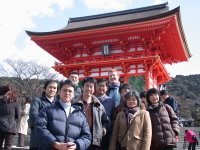 A couple weeks ago I went on the yearly departmental trip with other teachers from the English department at school. 9 of the 13 teachers ended up coming along for a weekend in Kyoto. Unfortunately, neither the Beach Boys Sensei nor the old guy who does kendo were able to make it. I promised them both before I would make up their part in drinking though. Fortunately, both the hilarious sarcastic teacher who helps with English club (the woman in glasses on the right) and the other younger teacher from Kendo (with the camera strapped around his neck and the leather jacket with the fur collar) were coming, so I knew I'd still have at least two people worth talking to.
A couple weeks ago I went on the yearly departmental trip with other teachers from the English department at school. 9 of the 13 teachers ended up coming along for a weekend in Kyoto. Unfortunately, neither the Beach Boys Sensei nor the old guy who does kendo were able to make it. I promised them both before I would make up their part in drinking though. Fortunately, both the hilarious sarcastic teacher who helps with English club (the woman in glasses on the right) and the other younger teacher from Kendo (with the camera strapped around his neck and the leather jacket with the fur collar) were coming, so I knew I'd still have at least two people worth talking to.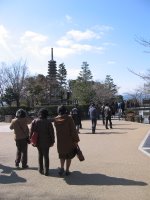 We were supposed to meet at the train station early Saturday morning to catch a 9 am bullet train, to arrive in Kyoto around 10:15. Since two of the English teachers live in the same apartment building as me, I caught a ride with them to the station. We meet up with the other teachers, sit around waiting for a couple stragglers and then get on our train. It's an hour and 15 minute train ride and they're talking about school about 15 minutes into it, which means they've exhausted all other outlets of conversation. We have reserved seats in one compartment; 10 teachers means we take up an entire two rows of seats, with two sets of three on one side and two on the other. In what would later prove to be a common theme for the trip, the three women sit on the side with the four seats, and the six guys sit on the other side. That is, some automatic sex segregation. In the picture you can see later that day how this played out on the streets, with the women trailing behind and the men rushing off ahead. (Kind of reminded me of the family hikes of my youth)
We were supposed to meet at the train station early Saturday morning to catch a 9 am bullet train, to arrive in Kyoto around 10:15. Since two of the English teachers live in the same apartment building as me, I caught a ride with them to the station. We meet up with the other teachers, sit around waiting for a couple stragglers and then get on our train. It's an hour and 15 minute train ride and they're talking about school about 15 minutes into it, which means they've exhausted all other outlets of conversation. We have reserved seats in one compartment; 10 teachers means we take up an entire two rows of seats, with two sets of three on one side and two on the other. In what would later prove to be a common theme for the trip, the three women sit on the side with the four seats, and the six guys sit on the other side. That is, some automatic sex segregation. In the picture you can see later that day how this played out on the streets, with the women trailing behind and the men rushing off ahead. (Kind of reminded me of the family hikes of my youth)Arriving at the station, I watch as the teacher ostensibly in charge of this expedition immediately takes us out the wrong exit. I know we're not at the right one, since it exits into a massive shopping complex and we're instead standing in front of a convenience store. Since I'm the youngest person on the trip and the newest teacher in general, I'm trying to let this kind of thing go in the interest of respect. However, after they proceed to spend about 10 minutes as a group trying to decide the best course of action, finally I just tell everyone to follow me since I've been here several times and know exactly where to go. Once I start walking, everyone falls in line and I lead them like duckling through the station and to our hotel. This is another theme of the trip; the teachers dissolving in the face of group decisions into an amorphous, directionless mass until someone - namely, me - prompts direct action. I assumed one of the other teachers would be sort of designated group leader, but since they're all off duty so to speak, pretty much everyone just wants to be led around.
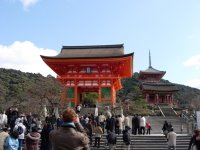 We drop off our bags at the hotel and head off to Kiyomizu Temple, a complex dating back to the late 8th century and one of the main sights of the city. (A little more info here) The other teachers, excited to show the place off to me, are disappointed to hear that this is the 4th time I've been to it; I've actually been there more times than anyone else in our group. Still, it's an impressive building no matter how many times one sees it, and it is a beautiful clear day in Kyoto. There are, as always, a lot of people there as well - both Japanese and foreign - but our group is special to be a big Japanese group with a single foreigner. Later, looking at some of the other teacher's pictures - like this one here - I was puzzled by how many in which I appear in the foreground. At first I wondered if I weren't just so tall I was inadvertently blocking all the shorter teachers shots. In retrospect, the teacher was deliberately putting me into the frame to make the picture that much more exotic. Of course, I certainly am not complaining about this.
We drop off our bags at the hotel and head off to Kiyomizu Temple, a complex dating back to the late 8th century and one of the main sights of the city. (A little more info here) The other teachers, excited to show the place off to me, are disappointed to hear that this is the 4th time I've been to it; I've actually been there more times than anyone else in our group. Still, it's an impressive building no matter how many times one sees it, and it is a beautiful clear day in Kyoto. There are, as always, a lot of people there as well - both Japanese and foreign - but our group is special to be a big Japanese group with a single foreigner. Later, looking at some of the other teacher's pictures - like this one here - I was puzzled by how many in which I appear in the foreground. At first I wondered if I weren't just so tall I was inadvertently blocking all the shorter teachers shots. In retrospect, the teacher was deliberately putting me into the frame to make the picture that much more exotic. Of course, I certainly am not complaining about this.Inside the grounds of the temple is a small shrine, Jishu, dedicated to a god of love and matchmaking. As such, it's crammed with young women at all times buying charms of all kinds; to meet people, to stay with people, to have kids, to have healthy kids, to have your kids meet people, to have your kids stay with people, to have you kids have kids...you get the idea. They sell charms of a sort at pretty much every shrine and temple in Japan, usually just at stall inside. At popular places like Jishu or Kiyomizu though, it reaches such a ridiculous level that it seems people are more there to buy souvenirs than actually see the place itself. That is, they become popular as souvenir shops selling goods associated with the place above the place itself.
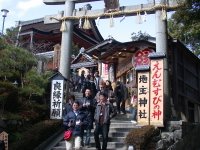 Also at the Jishu Shrine are two stones at a distance of perhaps 50 feet. Legend has it that if a person can cross between the two stones, walking with his or her eyes closed, his or her's wish in love will come true. Knowing that one of the teachers - the guy who loves to curse - is in his early thirties and unmarried, I started joking that he should do it. As he didn't immediately decline, I started pushing more, getting the other guy teachers to join in with some quality peer-pressure as we chanted "Do it, do it, do it!" He eventually flushed red, wussed out, and ran away down the stairs, with me and the other guys laughing behind him.
Also at the Jishu Shrine are two stones at a distance of perhaps 50 feet. Legend has it that if a person can cross between the two stones, walking with his or her eyes closed, his or her's wish in love will come true. Knowing that one of the teachers - the guy who loves to curse - is in his early thirties and unmarried, I started joking that he should do it. As he didn't immediately decline, I started pushing more, getting the other guy teachers to join in with some quality peer-pressure as we chanted "Do it, do it, do it!" He eventually flushed red, wussed out, and ran away down the stairs, with me and the other guys laughing behind him.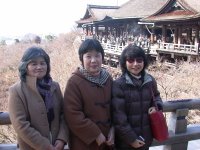 We walked through the grounds until we reached the most impressive part of the temple: the stage. Suspended over the valley below through a series of wooden pillars, it offers a panoramic view of the forest behind, gardens below and city beyond in the distance. I reminisced about when my brother visited and basically assaulted two Japanese girls here. (When they asked him to take a picture of them, he insisted instead that we all take one together, leading to one hilariously awkward shot where they clearly don't understand what is going on, and that really captures the deer in the headlights quality of their reaction to Matt) Anyhow, in about the same spot, I snapped this shot of the three female teachers. On the right is the funny teacher, the one in the middle is your stereotypical sweet old Japanese grandma, and the one on the left looks like Yoda and, I discovered on this trip, is really devoid of any discernible personality. Actually, I think Maiko made a much more biting, though uncharacteristically insensitive insult when she saw this picture, exclaiming, "That teacher dresses like a homeless woman!"
We walked through the grounds until we reached the most impressive part of the temple: the stage. Suspended over the valley below through a series of wooden pillars, it offers a panoramic view of the forest behind, gardens below and city beyond in the distance. I reminisced about when my brother visited and basically assaulted two Japanese girls here. (When they asked him to take a picture of them, he insisted instead that we all take one together, leading to one hilariously awkward shot where they clearly don't understand what is going on, and that really captures the deer in the headlights quality of their reaction to Matt) Anyhow, in about the same spot, I snapped this shot of the three female teachers. On the right is the funny teacher, the one in the middle is your stereotypical sweet old Japanese grandma, and the one on the left looks like Yoda and, I discovered on this trip, is really devoid of any discernible personality. Actually, I think Maiko made a much more biting, though uncharacteristically insensitive insult when she saw this picture, exclaiming, "That teacher dresses like a homeless woman!"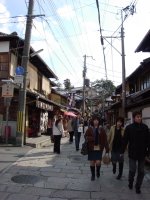 After walking out from the temple, we headed down a series of backstreets lined with shops. Whenever Japanese people go anywhere, they have an obligation to buy a souvenir for everyone they know or might conceivably meet in the near future, so we had to buy some Kyoto stuff. Luckily, every city or even small town in Japan has at least one thing it is "famous" for (Incidentally, Hamamatsu is famous for its eel and a candy called "Eel Pies" that doesn't really contain eel) that is sold all over the place. I couldn't believe that we'd been in Kyoto for less than two hours and were already buying souvenirs in preparation for the trip back.
After walking out from the temple, we headed down a series of backstreets lined with shops. Whenever Japanese people go anywhere, they have an obligation to buy a souvenir for everyone they know or might conceivably meet in the near future, so we had to buy some Kyoto stuff. Luckily, every city or even small town in Japan has at least one thing it is "famous" for (Incidentally, Hamamatsu is famous for its eel and a candy called "Eel Pies" that doesn't really contain eel) that is sold all over the place. I couldn't believe that we'd been in Kyoto for less than two hours and were already buying souvenirs in preparation for the trip back.That being said, it was an interesting area with a very traditional "Kyoto" feeling to it, both in the architecture, the small shops and restaurants, and the sort of feeling of walking on narrow winding lanes. Kyoto, despite the evocative nature of the name to us foreigners, is in reality a rather large, modern city, and the large, modern parts of it are pretty boring, if not outright ugly. It's kind of upsetting at first to see, but the Kyoto that we want to see is still extant, just a little harder to find.
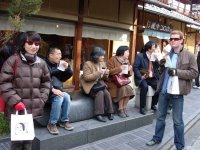 After this, we stopped for a break and had some snacks. Some of us, as you can see in the picture, sat down all hunched over with our legs pulled in like little children. We decided to break up for the time being and meet up again later for dinner. I went with the guys, who were going to walk through the city and see some sights on their way to visit Kyoto University, I suppose as a show of support for some of their students taking the entrance exams later that month.
After this, we stopped for a break and had some snacks. Some of us, as you can see in the picture, sat down all hunched over with our legs pulled in like little children. We decided to break up for the time being and meet up again later for dinner. I went with the guys, who were going to walk through the city and see some sights on their way to visit Kyoto University, I suppose as a show of support for some of their students taking the entrance exams later that month.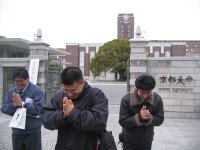 So we ended up on a long and largely uneventful trek through the city in which they got lost several more times and I had to either lead or ask for directions since they didn't want to talk to strangers. When we arrived at Kyoto University, we were so tired from walking that we never got any farther than the tourist information center. Since it had a video tour of the campus, we just chose to watch that instead of actually doing any more moving for a while. I was happy with this because I had visited Kyoto U before last time I was in Kyoto, and found it just as drab the second time as the first. On our way out, three of the teachers kind of bowed at the entrance and made a short prayer for their student's success. I insisted they do it again so I could take a picture, "to show the students later to prove you went." Then I made them hold the pose for about a minute, continuously saying, "Wait wait, one more second!" each time they tried to stop bowing. Notice that they're laughing in the picture, but, importantly, still bowing.
So we ended up on a long and largely uneventful trek through the city in which they got lost several more times and I had to either lead or ask for directions since they didn't want to talk to strangers. When we arrived at Kyoto University, we were so tired from walking that we never got any farther than the tourist information center. Since it had a video tour of the campus, we just chose to watch that instead of actually doing any more moving for a while. I was happy with this because I had visited Kyoto U before last time I was in Kyoto, and found it just as drab the second time as the first. On our way out, three of the teachers kind of bowed at the entrance and made a short prayer for their student's success. I insisted they do it again so I could take a picture, "to show the students later to prove you went." Then I made them hold the pose for about a minute, continuously saying, "Wait wait, one more second!" each time they tried to stop bowing. Notice that they're laughing in the picture, but, importantly, still bowing. We met up again for dinner at a very nice restaurant along the Kamo River, the ancient eastern boundary of the capital, from which the traditional road east to Tokyo, the Tokaido, began. I was, of course, mostly affecting a signature pensive-style pose for this photograph, but also actually was thinking a bit. The Kamo River is one of those places that figures prominently in so many books, plays, and historical accounts of Japan that I've read, that it is always both exciting and profoundly strange to suddenly be standing next to it. Somehow, when I read in Kabuki plays about the legendary battle between Benkei and Yoshitsune on the bridge over the river, it seemed totally outside my world. It was a world I could not imagine I would ever see, and in that sense, one that never did really exist. This is quite different than reading Dickens or Hemingway stories set in London or Paris; Europe feels quite immediate and close, and even somehow these works are tinged with a feeling of resignation in that my life will almost inevitably take me through those places. Standing on the banks of the Kamo River, or in the temples built by Hideyoshi, or on a forest path through the Japanese Alps next to two waterfalls that figures prominently in the story of Musashi, it seems almost comically unreal that I am here.
We met up again for dinner at a very nice restaurant along the Kamo River, the ancient eastern boundary of the capital, from which the traditional road east to Tokyo, the Tokaido, began. I was, of course, mostly affecting a signature pensive-style pose for this photograph, but also actually was thinking a bit. The Kamo River is one of those places that figures prominently in so many books, plays, and historical accounts of Japan that I've read, that it is always both exciting and profoundly strange to suddenly be standing next to it. Somehow, when I read in Kabuki plays about the legendary battle between Benkei and Yoshitsune on the bridge over the river, it seemed totally outside my world. It was a world I could not imagine I would ever see, and in that sense, one that never did really exist. This is quite different than reading Dickens or Hemingway stories set in London or Paris; Europe feels quite immediate and close, and even somehow these works are tinged with a feeling of resignation in that my life will almost inevitably take me through those places. Standing on the banks of the Kamo River, or in the temples built by Hideyoshi, or on a forest path through the Japanese Alps next to two waterfalls that figures prominently in the story of Musashi, it seems almost comically unreal that I am here. Anyway, the restaurant was basically just a single home perched on the river. We sat along a single long table looking out and were served a series of dishes in a distinctly Kyoto style of cuisine called kaiseki and waited on diligently by two little old women. Had a great dinner; drinking and chatting along with the other teachers as we waited for the next dish to be brought out. After a series of immaculately prepared dishes, came my most feared Japanese concoction: the foul chawanmushi.
Anyway, the restaurant was basically just a single home perched on the river. We sat along a single long table looking out and were served a series of dishes in a distinctly Kyoto style of cuisine called kaiseki and waited on diligently by two little old women. Had a great dinner; drinking and chatting along with the other teachers as we waited for the next dish to be brought out. After a series of immaculately prepared dishes, came my most feared Japanese concoction: the foul chawanmushi.  This "savory egg custard" is like a warm, sour egg pudding, with a disgustingly slippery texture. Since I had told a couple teachers that I hated chawanmushi, they were all really hoping it would be served during dinner, just to spite me. Usually, I wouldn't touch the stuff, but since I was paying more than a hundred dollars for the dinner, I felt obligated to choke every part of it down. People here seem to consider this dish a delicacy, but as you can see from the picture a teacher snapped of me eating, I do not. When it was put in front of me, they could not contain their glee, jibbing me in the ribs, snapping shots of me, and actually taking a video of me eating. Bastards.
This "savory egg custard" is like a warm, sour egg pudding, with a disgustingly slippery texture. Since I had told a couple teachers that I hated chawanmushi, they were all really hoping it would be served during dinner, just to spite me. Usually, I wouldn't touch the stuff, but since I was paying more than a hundred dollars for the dinner, I felt obligated to choke every part of it down. People here seem to consider this dish a delicacy, but as you can see from the picture a teacher snapped of me eating, I do not. When it was put in front of me, they could not contain their glee, jibbing me in the ribs, snapping shots of me, and actually taking a video of me eating. Bastards. After dinner, most of the teachers packed it in for the night, but a few others and I went out for some more drinks. Walking around downtown with just a few of them, looking for a bar, laughing at their bewilderment with all the lights and people out in the city, I suddenly became aware of how different they were from Tokyo people. Nice people all, to be sure, but just as assuredly they're from the sticks. When I walked around the campus of Kyoto University with the teachers, they marvelled at the sheer size of this campus that is smaller than Waseda and maybe a fourth that of UCLA. Almost all of them were born and all of them grew up in this prefecture, and they all came back here to work after college - sometimes even at the same high schools they attended. It's come up a lot here actually, when I start talking to students, teachers, or just friends around here about Japan, I realize that I've been to more places in their country than they have. It's amusing to say, but I'm a more worldly person in the Japanese sense than the other Japanese here!
After dinner, most of the teachers packed it in for the night, but a few others and I went out for some more drinks. Walking around downtown with just a few of them, looking for a bar, laughing at their bewilderment with all the lights and people out in the city, I suddenly became aware of how different they were from Tokyo people. Nice people all, to be sure, but just as assuredly they're from the sticks. When I walked around the campus of Kyoto University with the teachers, they marvelled at the sheer size of this campus that is smaller than Waseda and maybe a fourth that of UCLA. Almost all of them were born and all of them grew up in this prefecture, and they all came back here to work after college - sometimes even at the same high schools they attended. It's come up a lot here actually, when I start talking to students, teachers, or just friends around here about Japan, I realize that I've been to more places in their country than they have. It's amusing to say, but I'm a more worldly person in the Japanese sense than the other Japanese here!
Thursday, March 02, 2006
Be Mine, Mr. Adamy
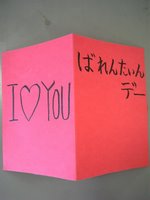 According to the Greeting Card Association, a source I know we all can agree to trust, 80% of Valentine's Day gifts worldwide are bought by women. In Japan, that figure rises to 100%, because here it is solely a day for women to give chocolates to men. Not just the men in their lives in the sense of the man they love, but quite literally "the men in their lives." This means friends, teachers, and even co-workers. So, Valentine's Day in Japan is even more of a crazy commercially manipulated holiday than in the US, even more divorced from any tradition or meaning than in the Western world, and yet somehow also even more necessary to participate in. In fact, the giving of chocolate here is so compulsory that there is even a name for that given out of necessity and not affection, 義理 (giri) or "duty" chocolate. The week before the big day therefore, the ghost of the (largely apocryphal) Saint Valentine arrives early to vomit his gaudy wares all over every damn store in the country, from department stores to 7-11's to drink stalls on train platforms.
According to the Greeting Card Association, a source I know we all can agree to trust, 80% of Valentine's Day gifts worldwide are bought by women. In Japan, that figure rises to 100%, because here it is solely a day for women to give chocolates to men. Not just the men in their lives in the sense of the man they love, but quite literally "the men in their lives." This means friends, teachers, and even co-workers. So, Valentine's Day in Japan is even more of a crazy commercially manipulated holiday than in the US, even more divorced from any tradition or meaning than in the Western world, and yet somehow also even more necessary to participate in. In fact, the giving of chocolate here is so compulsory that there is even a name for that given out of necessity and not affection, 義理 (giri) or "duty" chocolate. The week before the big day therefore, the ghost of the (largely apocryphal) Saint Valentine arrives early to vomit his gaudy wares all over every damn store in the country, from department stores to 7-11's to drink stalls on train platforms.Usually I try to ignore Valentine's Day and then wait for it on the day to pass engaged in some totally unrelated activity, but this year I was both able to avoid it as a harbinger of loneliness - safe in the knowledge that I have a girlfriend this time for once - as well as enjoy another occasion for attention. Also, I didn't have to do anything myself, which is always nice.
I arrived at school that day to find a box of chocolate on my desk, which I was told was from the female English teachers. This got me really excited, because that means it was giri chocolate. This was amusing to me that they feel they have to give me chocolate, and also oddly pleasing since it means I am enough a part of the social fabric of the school for the other teachers to have a sense of duty towards me. I kept trying to get one of the teachers to admit she had to give me this entirely out of a sense of obligation, as that made it perversely more valueable to me.
The week before in English club I had introduced standard Valentine's vocabulary like "Be My Valentine", "Happy Valentine's Day!", and then watched the episode of the Simpsons where Ralph falls in love with Lisa on Valentine's to introduce "I Choo choose you!" The kids then made Valentines for each other. The next week they exchanged their cards. Surprisingly, I actually got some really nice ones from the girls in the club too, including a ridiculously labor-intensive one from a girl with a crush on me that must have taken an hour to craft, and another from the girl who has so much scorn for me that she couldn't be bothered to write my name correctly, wishing a "Happy Valentine's Day to Adamy." Whatever, she's fat.
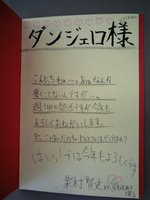 The other teacher supervising the club, D'Angelo Sensei also got a great card from the greatest kid Kenji "KMK/King of Kurimura/Kuri-chan" Kurimura. Translated, it reads:
The other teacher supervising the club, D'Angelo Sensei also got a great card from the greatest kid Kenji "KMK/King of Kurimura/Kuri-chan" Kurimura. Translated, it reads:Dear Mrs. D'Angelo,
Good Afternoon! Hmm...I don't really know what to write here...We only meet once a week for club, but please keep up the good work next year too!
P.S. So...how did those candles and candies I gave you the other day work out?
Okay! Anyways, thanks a lot,
With all my love,
Kenji Kurimura
KMK is referencing Christmas time at our Secret Santa party, at which time he gave the teacher scented candles and a bag of aphrodisiac candies, ("A gift for you and your husband," he said with a wink) which at the time made her flush with too much embarrassment to yell at him. The note had basically the same effect. And just like that time, this time too I laughed really hard and told KMK he was a great kid.
After school Maiko came and we had a nice dinner together and then shared a bottle of wine. I got a very nice card and a delicious box of chocolate from her too. Unfortunately, playing into the Japanese style of Valentine's Day means I have to return the favor on "White Day" a new holiday domestically manufactured in Japan and held a month later in March, giving gifts back to all the women from whom I received the same.
Fortunately, as a product of Japan it is subject to the restrictions of the country, which means that as I man I don't really have to do anything for anyone else if I don't feel like it.
Subscribe to:
Posts (Atom)

